- TOEFL Writing Correction Topics
- OET Mock Tests
- Writing Correction
- Speaking Mock Test
- Reading Course
- Listening Practice Tests
- FREE Practice Tests
- OET Writing Correction
- OET Reading Course
- OET Speaking Mock Test
- TOEFL Writing Correction
- PTE Writing Correction
- OET Listening Practice Tests
- OET (Occupational English Test)
- PTE (Pearson Test of English)

IELTS Speaking Cue Card Topic: Education
- Helpful resources
- IELTS Writing
- IELTS Writing Correction

Education is a cue card topic that often comes up in the IELTS speaking part 2. Below you will find a list of some exam questions and answers that you could encounter during part 2 of the IELTS Speaking test.
The questions below are based on the real IELTS speaking exam. They serve as a great IELTS Speaking part 2 cue card prediction questions to help you prepare better before your test.
Education Speaking Part 2 – Cue Card 1
Talk about a new language that you learnt. Please say
You should say:
- when did you do it
- how did you do it
- who helped you with it
- and explain how you feel about it now.
I am going to talk about learning English. I have been learning English since I was a child. I went to an international school so from a young age some of the subjects were taught in English. This was really difficult at first as not only did you have to be good at science or maths, you had to listen to the teacher explain it in English too. When I went to secondary school, my parents employed a private tutor to teach me at home. The teacher was a native from the UK so the classes really helped me learn more typical phrases and the correct pronunciation. The classes were invaluable and have really paid off as my English is much better now. Since then, I have been self taught. I read books, watch TV series and listen to podcasts in English which really helps immerse me in the language. Sometimes, I chat with English speaking friends and they correct me and I ask questions about the bizarre phrases and colloquial expressions they use. English uses a lot of jargon and slang , it can be difficult to understand but eventually I managed to catch their drift . I make a note of new vocabulary and use an app on my phone to test myself every now and again. Now I am studying translation, I am using English every day so I don’t need to brush up on my skills as much now. I feel proud of my English level, I have worked hard to get to this point.
Education Vocabulary Speaking Part 2 – Cue Card 2
- paid off – got a good result
- bizarre – strange
- jargon and slang – technical and local dialect vocabulary
- catch their drift – understand their meaning
- to brush up on – to practice something after a long time
Other IELTS Speaking Part 2 Topics
Here are other common topics that you could come across during the IELTS Speaking Part 2 test.
- Event / Instance
- Family / Friends
Talk about a skill that was difficult for you to learn. Please say
- when did you learn it
- why did you learn it
- how do you learn it
- and explain how you feel about this skill now.
I am going to talk about learning to dance. Most Italians are pretty good dancers and lots of my family members dance well. I think I was in secondary school when I realized I had two left feet . I had no natural rhythm at all and I felt embarrassed dancing in public. Dancing in public is a way of life in Italy, everybody dances at family events and special occasions. One of my friends offered to teach me to dance. She is a salsa teacher and gives classes in a studio. So, I decided to sign up and took up classes a couple of times a week. The first few classes were awful! I got really flustered trying to listen to the music and follow all the instructions at the same time. It probably took me a few months to feel more comfortable and less embarrassed. As well as the classes, I watched videos at home and copied the moves. Although I still wasn’t a natural, I persevered with the classes for six months, eventually starting to move my hips and not look like a giraffe dancing. After that, I gave up as I didn’t have enough time to attend the classes. I continued dancing with friends and family and got a few compliments on my dancing. I am proud that I made the effort to improve my skills and I will never forget the lessons. It is almost unheard of not to dance in Italy, we are a very musical and passionate nation.
Vocabulary for Cue Card 2
- have two left feet – no ability to dance
- sign up – register for a course or activity
- flustered – nervous and embarrassed
- almost unheard of – very unusual
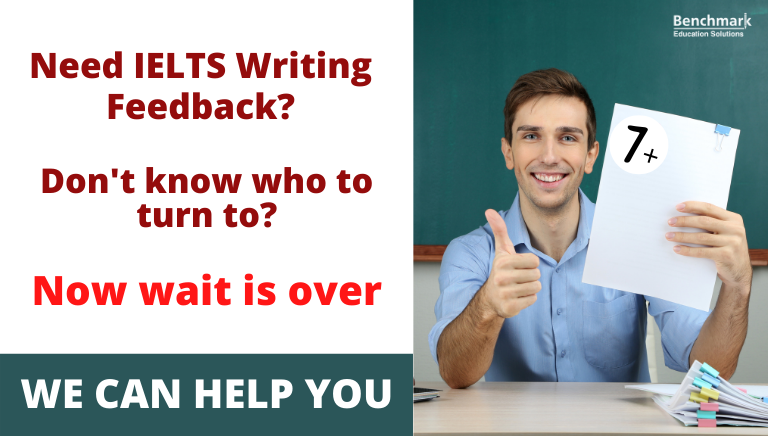
Talk about an elementary school teacher you have a good memory of. Please say
- what he/she was like
- the subject he/she taught
- a memory you have of him/her
- and why you this is a good memory, in your opinion
- What he/she was like I am going to talk about Miss Elaine who was my favourite elementary school teacher. She was probably the kindest teacher I have ever had. She was very patient with us, but she also knew how to set 9 clear boundaries 10 . She would always let us know when we did something wrong, but she would also try to understand why we did it.
- The subject he/she taught Miss Elaine was my math teacher. I always struggled 11 with math, but she was there to help me, and she gave me a lot of individual attention 12 , which I very much needed, because I would get very anxious trying to solve a math problem on my own.
- A memory you have of him/her I remember that one time she gave us a worksheet 13 to complete. I could not do it and I started to tear up 14 . Everybody else was looking at me in the classroom. Miss Elaine ran to me and asked what was going on. I couldn’t really speak because I was crying and feeling stressed. Miss Elaine told me everything was okay and asked me if I was crying because I was nervous that I couldn’t solve the problems when others could. I just nodded 15 and she gave me a warm hug. Then she sat with me, and we solved the problems together.
- And Why you this is a good memory, in your opinion To me that is a good memory because I really felt like she wanted to and was able to understand me. Especially when you are young, it is hard sometimes to know, let alone 16 say how you feel. Her understanding and support 17 had a huge 18 impact 19 on my confidence.
Vocabulary for Cue Card 3
- set = (in this case) put
- boundaries = limits
- struggled = had problems doing something
- individual attention = focus on one person
- worksheet = a piece of paper with activities to complete or questions to answer
- tear up = have tears come up in your eyes
- nodded = said yes with the head
- let alone = even less
- support = help
- huge = extremely big
- impact = (in this case) effect
Talk about a skill that was difficult for you to learn. You should say
- what skill it was
- why you learnt it
- why it was difficult to learn
- and explain how you felt about this.
I am going to speak about learning to speak another language. I learnt to speak French a few years ago. I decided to learn in order to communicate better when I travelled abroad. I had learnt it at school but forgotten a lot in recent years and felt I should brush up on it. I wanted to challenge myself and prove to myself I could do it. So I found a teacher online and then we met face to face . The teacher was a French native but spoke really good English too which helped when explaining the grammar. As well as the classes, I listened to podcasts and used vocabulary apps to learn new words. At first, it felt near impossible to grasp the vocabulary and master the pronunciation. I felt really frustrated that I didn’t seem to be picking it up more quickly and it was embarrassing to repeat the same things over and over again in class. But I persevered and gradually it got easier. It was as if part of my brain opened up and started to accept and remember the language. I was elated . From that moment, I was on a roll ; learning new words and even going to a language exchange group to meet other like- minded people. Now when I go on holiday to France, I feel more confident going into shops or ordering food in a restaurant so it was worth the effort and time I put into learning French.
Vocabulary for Cue Card 4
- face to face – in person
- grasp – to understand
- elated – very happy
- on a roll – a prolonged period of success
- like minded – similar thinking people
Describe an area of science (physics, psychology and so on) that interests you. Please say
- how do you know about it
- why are you interested in it
- What it is? I would like to talk about physics, an area of science that focuses on matter. It mainly deals with how matter moves in space and time, and what forces act upon it. In general, this field aims to make people understand how the universe behaves. For ordinary people, Physics is more understandable in situations like rubbing two things together and creating static electricity or the force applied whenever the washing machine dryer rapidly rotates. And to many, this subject can be identified when driving a car because natural forces help cars to start, move and stop.
- How do you know about it? I started learning physics when I was 8 years old as it was a formal subject in my school curriculum. As my class teacher used to teach concepts of physics in a very interesting manner, I developed keen interest in it during my childhood. What’s more my father is a science professor at a local university so I also got to know a lot about physics through him.
- Why are you interested in it? Physics interested me because it involves a lot of math. I find it easier to work with formulas for force and understanding how they work compared to other branches of science. Physics covers several areas and every time I encounter them in real life, my love for physics grows further. Moreover, I feel satisfied whenever I realize the scientific explanation and apply its practical aspect
Vocabulary for Cue Card 5
Talk about another course that you would like to take, not related to your previous studies. Please say
- what kind of course would it be
- what do you want to learn from it
- why would you choose it
I am going to talk about photography. I would love to take a photography course. I have always been interested in taking photos since I was a young child. I was given a camera when I was a teenager and used to go out taking pictures of animals and people. Nowadays, I mainly take photos using my smartphone but I miss the skill of taking really good photos. I would like to take the course so I could learn about setting up the shot, capturing a moment and also some of the technical stuff about filtering and perfecting photos.
I know that you can do these courses as an evening class or even during the summer but I just haven’t had the time or the money since I have started university. You can even learn online but I don’t think that is the same as a hands on experience.I have a friend who has completed the course and he takes amazing photos of people and beautiful architecture – it really is awe inspiring . If I did the course in the future, I would like to take a trip to a famous sight like Machu Picchu or the Niagara Falls and capture some amazing shots there. In the meantime . I am taking photos with my smartphone of me and my friends. I use the different filters and post photos on instagram so my friends and family back home can keep up to date with my life.
Vocabulary for Cue Card 6
- set up – prepared
- hands on – direct experience
- awe inspiring – amazing
- in the meantime – the time between now and something in the future
- keep up to date – to be informed of the current situation
Talk about a person you know who learnt a foreign language. Please say
- who is he/she
- what was his/her motivation for learning the language
- how frequently does he/she use it
- and how do you feel about him/her
- Who is he/she? I am going to talk about my aunt Tina. Aunt Tina comes from a multicultural family background, and is a polyglot , speaking French, Danish and Spanish fluently. She learnt French and Danish from her parents, and made the decision to major in Spanish at university. She completed her degree and later lived in Argentina for about ten years, where she met her husband, Pedro.
- What was his/her motivation for learning the language? Growing up with different cultures, my aunt developed a fascination for languages, and it seemed she was picking them up with ease. When she was fourteen years old, her parents travelled with her to Spain for the summer holidays, and she realised she was able to comprehend most of what was being said to her and around her. Her knowledge of French was a huge leg up, due to the common linguistic roots between French and Spanish. I think she really identified with the culture there, and her interest in the language grew stronger over time.
- How frequently does he/she use it? My aunt practises the language on a regular basis. Although she no longer lives in Argentina and her husband speaks a little French, they find it easier to communicate in Spanish. My aunt introduced the languages she knows to her children, and she was beside herself with joy when one of them expressed an interest in learning an additional foreign language in school. Sometimes, she would speak to her children in Spanish and they would respond in a different language. It is their way of learning new words and phrases!
- and how do you feel about him/her? I find her inspiring. Learning languages is like a walk in the park for her, and I admire her courage to pursue her dreams and live life as she sees fit .
Vocabulary for Cue Card 7
- Polyglot = someone who speaks more than two languages
- Fascination = strong interest in
- picking them up = (in this case) learning them
- leg up = help
- linguistic roots = linguistic origins
- on a regular basis = regularly
- beside herself with joy = extremely happy
- a walk in the park = extremely easy
- as she sees fit = the way she wants, as she believes is right for her
Describe you preferred location for studying. Please say
- where is this place
- what does it physically look like
- why is it your favourite place to study
- follow up question: Do other people you know use the same place to study?
- Where is this place? I am going to talk about my favourite place to study. It is actually a public library. As a tour guide, I need to constantly increase and update my knowledge of the places I tour, and the library provides me with all the resources I need for that.
- What does it physically look like? The public library I go to is quite big. It has a Victorian architecture and outside look to it, but it’s very modern on the inside. It offers a plethora of books on a variety of subjects, such as history, art, languages, and so on. Thereare plenty of tables and chairs throughout the library. Some chairs look more like armchairs an may be placed by large bay windows, although I prefer less exposed areas, to help me concentrate better. There is also an area with computers for people to use, as well as printers and scanners.
- Why is it your favourite place to study? I find myself being more productive at the library. I believe that being surrounded by books really sparks motivation in me. The members of staff are all so friendly, and I feel like there is little that can distract me there. It is really the ideal place for me to complete my work without any interruptions. I enjoy the abundance of books and resources there. The history section is of particular interest to me , due to my job. There are plenty of books on local history, and I feel like there are always new facts and anecdotes for me to learn.
- Follow up question: Do other people you know use the same place to study? I know people who use this library, but I don’t believe they go there to study. Many of them make use of the computers or borrow books rather than study. I see many people conduct research or focused on their own personal projects, but I do not know them personally.
Vocabulary for Cue Card 8
- plethora = range
- exposed = with nowhere to hide
- productive = making good use of time by completing many tasks and actions
- sparks motivation = inspires enthusiasm/motivation
- abundance = large quantities
- of particular interest to me = particularly interesting to me
- anecdotes = small stories that relate to a main subject
Talk about a course which left an impression on you.
- what course was it
- where did you take that course
- what was the course like
- and why did it impress you
- What course was it? I am going to talk about a course I took and which left a strong impression on me. That course was a Spanish course I took over the summer. I had studied Spanish in school but wanted to hone my skills.
- Where did you take that course? It was an intensive and immersive language course at a language institution in a nearby town. It was delivered by a Guatemalan teacher, which meant I got insight into Guatemalan culture and idioms. The institution was only a twenty-minute drive from where I live. Very convenient!
- What was the course like? The course was very engaging and inclusive. Our teacher used a myriad of media to teach us: films, videos. Books, magazines, recordings, songs, and more! It was truly immersive and I was completely hooked . The classes took place three times a week, and I would look froward to each class. Another aspect I truly appreciated about the course was the fact that she only spoke to us in Spanish, with the occasional English translations, where needed. It really forced us to think and produce in the language. It was great!
- Why did it impress you? I was very impressed by this course because I never realised the power of immersive programmes. I sincerely feel like I got more bang for my buck than with other more traditional courses. I can certainly feel that my speaking skills, and my reading skills for that matter, have increased tremendously . It also taught me about the power of visuals in conveying messages, and that anything is possible when we put effort into it! I did not expect that level of improvement on my part, and I am very thankful for the course and, of course, the teacher!
Vocabulary for Cue Card 9
- hone = sharpen
- engaging = (in this case) catching my interest
- myriad = range
- hooked = (in this case) so exciting I want to keep doing it
- bang for my buck = better value for the price you pay
- tremendously = in large amounts, to a very large degree
Cue Card 10
Talk about a practical skill you have learnt.
- what skill have you learnt
- how did you learn it
- and why is it an important skill
- What skill have you learnt? I am going to talk about an important practical skill I learnt when I was young. It is a cooking skill I use today and which involves frying eggs.
- When did you learn it? I believe I was about 12 years old when my mom called me to the kitchen. I was clueless about cooking, and quite frankly disinterested in the subject. But my mom, wise as an owl , said to me: “you may not find it interesting, but, believe me, you will find useful”. At the time I did not realise how right she was.
- How did you learn it? She showed me exactly how to do it, and even let me try it out myself. The first time, I went too strong, and part of the eggshell fell into the pan. I felt so embarrassed and told my mom I was giving up. My mom was never the kind of person to beat around the bush . She essentially told me to stop making excuses, and pull myself together so I can try again. She didn’t do it in a malicious way. She just wanted to help me get back on the horse . The second time, I managed to do it properly. She congratulated me and let me try it a few more times.
- And why is it an important skill? This skill is so very important, because it is one of the easiest meals to cook. It helps a lot when my schedule gets too busy for me to have the energy to cook anything else. It also inspired me to attempt to cook other dishes. When I mastered the skill, I thought to myself, if I can cook that, imagine what else I could make? It was a significant confidence boost for me
Vocabulary for Cue Card 10
- clueless = have no idea, have no knowledge of something
- wise as an owl = very wise person
- beat around the bush = avoid saying what you think because it is uncomfortable
- pull myself together = get over a negative emotional state
- malicious = evil, meaning to hurt
- get back on the horse = try again after a discouraging failure
- confidence boost = an action that helps increase someone’s confidence/self-confidence
Leave a Reply Cancel reply
Your email address will not be published. Required fields are marked *

- ielts writing
- ielts listening
- ielts speaking
- ielts reading
- ielts practice test
- IELTS Sample Reports
- IELTS Sample Essays
- IELTS Sample Letters
- IELTS Vocabulary
Exam Updates & Tips!
Signup for preparation and special offers!
You have successfully joined our subscriber list.
IELTS Preparation with Liz: Free IELTS Tips and Lessons, 2024
- Test Information FAQ
- Band Scores
- IELTS Candidate Success Tips
- Computer IELTS: Pros & Cons
- How to Prepare
- Useful Links & Resources
- Recommended Books
- Writing Task 1
- Writing Task 2
- Speaking Part 1 Topics
- Speaking Part 2 Topics
- Speaking Part 3 Topics
- 100 Essay Questions
- On The Day Tips
- Top Results
- Advanced IELTS
Education Vocabulary: Word Lists and Pronunciation
This is the essential vocabulary for education about schools, subjects, studying and university. There is an audio to listen to the pronunciation of the words. These are the most common words and collocations which you will need to learn in order to talk or write about school or university successfully. After each section of vocabulary, there are exercises for you to practice using the words.
Click here to download the PDF version of this page: Education Vocabulary PDF . Please note that the PDF does not contain the answers – you must check your answers on this page.
Educational Institutions
- kindergarten = pre-school education
- primary school
- secondary school
- college = further education
- higher education = university education = tertiary education
- post-graduate school = university for students studying beyond degree level
School Subjects
- natural science
- religious studies
- information technology (IT)
- physical education (PE)
- cookery = domestic / food science
- handicrafts
Vocabulary Exercises: School Subjects
- One of the reasons that I didn’t like ……………… was because of the lab work which sometimes involved dissection.
- I’ve always enjoyed learning about how chemicals react with one another so I decided to choose …………. as one of my main subjects.
- When I was a child, we practiced ………………… three times a week which was fine in summer but was freezing during the winter when you have to football or hockey outside.
- My teacher encouraged us to take part in ……………………… in order to develop skills beyond what is taught in scheduled lessons.
- I used to find complicated calculations difficult as well as algebra but when we got a new ………… teacher, it all become much easier to understand.
- One of my favourite subjects was …………………… because you had a chance to get out of the classroom and learn more about the environment.
- Teachers were really strict on ……………… in exams. The exam invigilators won’t even let you have your bag in the exam room.
- Poetry should be taught more in ………………. lessons in order to help students develop a deeper understanding of their language and culture.
- I always loved studying maps. We spent a lot of time in our ……………. lessons tracing the borders of countries and learn the capital cities of different countries.
- My worst subject at school was …………… because I was completely tone deaf.
- physical education
- extra curricular activities
- math’s
Useful Language & Collocations
- lab work = laboratory experiments
- dissection = cutting up animals for scientific research
- scheduled lessons = lessons which are planned and written into a school curriculum
- algebra = formulas and equations in mathematics
- to give out or assign homework / to do or complete homework
- to complete high school / to graduate high school
- to do, to participate or to take part in school activities or sport
- tracing = copying, outlining in pencil
- tone deaf = without an ear for music = unable to appreciate or hear different music and notes
Types of Schools – Same-Sex & Co-Ed Schools
Watch this video to learn the advantages or single-sex schools and the plus points of mixed schools. This video contains ideas and vocabulary to help you express your ideas clearly.
University Vocabulary
University Courses
- BA / BSc = Bachelor of Arts Degree / Bachelor of Science Degree
- MA / MSc = Masters of Arts / Masters of Science
- PhD = Doctorate
Other Courses
- Certificate = a lower level qualification often offered at colleges rather than universites. This is also the word used the for documentation received for completing any type of course or degree (she received her certificate for her BA degree).
- Online Course
- Distance Learning Course
- Vocational course = a course which teaches you skills for a specific job, for example engineering.
- Non-vocational course = a course which is not related to a job but to a general subject instead, such as Biology.
Useful Verbs & Nouns for University
- to graduate from a university = complete a degree course / to finish university
- to enroll on a degree course = put your name down for a degree course
- to major in physics = to choose physics as your main subject at university
- to attend a lecture = to go to listen to a speaker at university often with a large audience in a lecture theatre
- to attend a tutorial = to go to a meeting with a professor usually in small group held in his/her office
- deliver a lecture = to give a talk or presentation
- to lecture in media studies = to talk about media studies or to teach media studies at university
- the faculty of business = a department specialising in business at university
- to read history = to study history
- to do or complete coursework = doing project work or assignments as part of your course
- undergraduate (n) = someone currently doing their first degree
- graduate (n) = someone who has completed a degree course
- note-taking = being able to take notes in a lecture while the lecturer is talking
- keeping up with the work load = being able to maintain the level of studying required
- fall behind with studies = fail to keep pace with the school / university work
University Work
- presentations
- dissertation
- project work
Vocabulary Exercises: Universities
Complete the following sentences are university education using no more than one word.
- People who have ……….. from university stand a better chance of finding a good job.
- I hope to enroll ………. a degree in law next year in the UK.
- There is a lot of competition to get a ……………….. but without it I won’t be able to afford the universities fees.
- One of the keys to successful ……………. is knowing where to look for information and how to judge which information is most current and relevant. Knowing the best sources of materials is essential.
- scholarship
Other Useful Vocabulary for Education
- literate = to be able to read and write
- illiterate = unable to read and write
- the literacy rate = the percentage of people in a country or region able to read and write
- comprehensive education = a well-rounded, broad education covering a variety of subjects
- scholarship = an award of either free or supported education for high achievers
- student loan = money taken by a student to pay for their education which they must pay back after graduating
- pay off a student loan = to repay money borrowed for university education
- intensive course = a course which runs over a short period of time but contains a lot of information and training
- play truant / truancy = not attending school / being absent from school without permission
- gap year = to take a year out between high school and university
Vocabulary Exercises: Useful Education Vocabulary
Complete the sentences using no more than two words.
- The rate of …………… is higher in developed countries than in under developed countries.
- Schools should offer a ………………… which includes subjects relating to all minority groups.
- The rise in university fees has led to a large proportion of students taking out ………………… which can often be difficult to pay back.
- Students who take a …………… often find it difficult to get back into their studies again.
- Rather than the government offering free university education for all people, they should, instead, ensure that a certain number of gifted individuals receive a ……………….
- comprehensive education
- student loans
Useful Pages for IELTS
- Vocabulary for IELTS Lessons
- Education Essay Questions
- All Writing Task 2 Lessons Tips & Videos
- All Speaking Lessons, Tips & Videos
Get my free lessons by email
Subscribe for free to get my new IELTS lessons sent to your email inbox.
Email Address
Hi Liz. I am Andre Fatur from Indonesia. i would say thank you cause i have a lot of knowledge about vocabulary in Education.
I’m glad it was helpful 🙂
Hi Liz , i’m really glad that i found your website and actually one of my teachers showed me you . your vocabs and the voices you have for them is the best specially for the ones who aren’t local englishman and are learning english as a second one just like me . me and my friends see your videos every session in our class . I wish you all the best
So glad you enjoy my lessons 🙂 Best wishes to you and your classmates 🙂
Great. Thank you so much, it help me a lot. Stay blessed
You’re welcome 🙂
Its a great help. Thank you so much Liz. May god bless you with all happiness…
I’m glad it’s helpful 🙂
Hi I am currently enrolled in school for nursing and I feel very uncomfortable when it comes to my vocabulary, I had brain surgery twice & suffered with seizures for 3years, I am happy to say I am better now and the Tumor is gone completely ,however I am depressed when it comes to my vocabulary because I don’t remember much at all and I often get my words mixed up when speaking so this is a big deal for me to learn and expand my vocabulary, thank you but I have no clue of where to begin at this point. I love to read so I have been reading a lot on your website, I must say I have learned some information just reading the comments. what do you suggest? thanks (my name is MINDY)
Hi Mindy, I do sympathise. I know what it is like to have language impairment due to neurological problems. The key is to take it slow and start incorporating the new words in your daily language until they become part of your natural English. Try my ideas e-book – it includes useful vocabulary and ideas for over 150 essay topics (which are also speaking topics). It’s on 55% discount this week: https://elizabethferguson.podia.com/ . There’s also a grammar e-book which might help a lot as it also contains great vocab. But don’t rush through it. Aim to absorb 70% of the vocab for each topic. Use those words daily by a) speaking to yourself about the topic – express your thoughts, have debates with yourself b) write an essay about it c) read further on google about the topic. Continue to repeat this until some words stick in your mind. Then repeat the process over and over again. The other thing I want to you do is not push yourself and do NOT give yourself any pressure or fixed goals. The learning must be natural and come from the pleasure of learning. Learn for enjoyment, not because you have a goal. This will make a huge difference. The harder you push yourself, the further away your goal often gets. Do small amounts each day and no more. Take breaks as often as you need. To learn IELTS exam techniques, see my Advanced Lessons in my store and also review all my free lessons and tips. I hope this helps. Good luck 🙂
Thank you very much Liz. I always follow your IELTS lesson to use not only for myself but also for my students. All your materials are helpful to improve my English for an IELTS exam. All the best.
Glad my site is useful. Wishing you all well 🙂
Thanks a million for the strenuous efforts you exerted.
I admire you how Being a good teacher. You are the best, no need to follow others for IELTS . love Zeliha
Thanks for your kind comment 🙂 I hope your IELTS preparation is going well 🙂
Lovely ! Thanks a lot Liz.
What does it mean “I can’t stress enough” ?
It means I am stressing the importance of something. It is an expression in English 🙂
Many thanks!
That’s an awsome work! I really admire ur job here 🙂
You are so important to us that I can` just thank you enough.
THANKS A LOT!
Hi Liz! I have a plan to do the academic IELTS test , I live in the UK , in the speeking test if I used contraction or words like ,wanna ,gonna would that be acceptable or I have to say Iam going ,Cannot etc…
See this page for your answer: https://ieltsliz.com/ielts-speaking-free-lessons-essential-tips/ . All main pages are accessed through the RED BAR at the top of the website.
Hello Liz, Please I am a stay-at-home mom so I’d like to know how to construct my answer when I’m asked to talk about my work. please note that i have worked as a consultant in an agricultural firm, but i was made redundant.
IELTS speaking is not a trick test. It is an informal chat with the examiner. Just be open, honest and chatty: “I used to work as a consultant in an agricultural firm, but now I’m a stay-at-home Mom.”. When you give this answer, the examiner will note your use of two grammar tenses and good vocabulary. The examiner will then decide whether to continue to talk about your work in the past, or change it and talk about your home. This will be the examiner’s choice – the examiner makes the decisions of topics. So, be open, friendly and chatty at all times.
You are really touching lives. Thank you sooo much.
Indeed she is!
Thank you so much Liz , I find this lesson really helpful .
It is the first time I access there. It involves a wide range of vocabulary. Thanka to all the leaders
In my point of view, there is no subject name MATHS. It is Mathematics and we call it as math.
The word “math” is US English. The word “maths” is UK English.
Thank you for clarifying me 🙂
Hi Liz, You talked about math’s teacher. If it would Science or English then also we will use ” ‘s “?
In British English we say “maths”, in US English it is “math”.
There’s this slight confusion I’ve got. There are some words which can be used with an S as well as a Z, for e.g Realized, Exercize. Which one is correct?
“z” is american spelling and “s” is British English spelling. Don’t mix them. Choose which spelling you will use and stick with it.
What is the difference between agree or disagree and to what extent do you agree or disagree types question?
https://ieltsliz.com/ielts-essay-instructions-agree-disagree-to-what-extent/
Hello… Take my cordial thanks Liz. I purchased your writing videos and I find it very useful. I’m looking for at least 6.5 band before I thought that it was too difficult to get 6.5 in writing segment but after watching these videos my confident level is increased. And your all tips and lessons are wonderful, to be honest. That is why, again thanks s lot 😘😘😊😊❤️❤️
Make sure you aim for accuracy in your writing – all errors reduce marks. Also spend time analysing the question, you must address all issues directly. Avoid using learned phrases – all sentences must be your own. So, you can learn vocab and linking words but not phrases. Good luck !! 🙂
The work that you do for us, learners of English from all over the world, cannot be valued. Thank you for putting your heart and soul in making us more literate in English! I wish you luck and success!
what is best way of writing process chart
See all my tips for writing task 1 on this page: https://ieltsliz.com/ielts-writing-task-1-lessons-and-tips/
Hi Liz, I am so grateful to you that I can know everything about IELTS from your website. It is a very useful and perfect one for me.You are a great teacher.
Best Regards, Mai
I achieved 6.5 with the help of you because I watched your all video. It’s very beneficial thanku so much u are great teacher
Well done !
your lessons are amazing and very useful, thank you
Hello Liz , You are the great teacher in the world..I spentmy whole day on this site.there many things which help me in many situations..m so happy that I have great great teacher..May God bless youuu😊☺️..thnx a lot Liz
Thanks so much for telling me you find my site useful 🙂
My exam will be held on 13 october nd m weak in listening nd reading . pls mam u send me some listening Mp3 in my email
You can find online listening on this page: https://ieltsliz.com/ielts-listening/
HI liz my name is nyom nyom i am from Indonesia could you help me how the way to improve my writing skill? please send in my email thanks before
See my advanced lessons if you need help with writing task 2: http://subscriptions.viddler.com/IELTSLizStore
Thanks to my best teacher!
hi i am going to appear for my ilets exam next week but i am not sure about my reading skills. can you give me some good tips to improve my skills in reading
https://ieltsliz.com/ielts-reading-tips-how-can-i-improve-my-score/
Dear Liza, Hello Liz, I am Totok Eko Suwito, I am an English teacher in Indonesia, I want to practice my listening especially because I ‘m going to have the IELTS test, if you don’t mind, Would you send me the script and audio MP3 of the listening above to my email. thank a lot your sincerely Totok Eko Suwito
https://ieltsliz.com/liz-notice-2015-2016/
Hello Liz, Please liz l wonder when I want to get 7 score I found different types of vocabulary for examle the 8or 9 band’s vocabulary in some video more different than band7??
There is no such thing as band 7 vocab and band 9 vocab. Your vocab score is not marked in that way. It is based on range, accuracy, collocations and also the number of errors – and spelling.
I am so weak in listening vocabulary. Give me some tips.
That is really superlative vocabulary and it can play an indispensable role in IELTS test. Thanks Liza and i would like to say one thing more, your expressions are really appreciated. All the best. Mazhar Ishfaq
Thanks Liz. I accidentally came upon your site and found my essay shared by someone on your blog. I liked your feedback. I have rewritten this essay for the next edition of my book – A Wealth of Academic IELTS Essays.
Great. Good to know my feedback is useful 🙂 Liz
Speak Your Mind Cancel reply
Notify me of new posts by email.
Advanced IELTS Lessons & E-books

Click Below to Learn:
- IELTS Test Information
Copyright Notice
Copyright © Elizabeth Ferguson, 2014 – 2024
All rights reserved.
Privacy Policy & Disclaimer
- Click here: Privacy Policy
- Click here: Disclaimer
Return to top of page
Copyright © 2024 · Prose on Genesis Framework · WordPress · Log in
Free IELTS lessons signup

- Academic practice
- General practice
- Task 1 Academic
- Task 1 General
- Task 2 (essay)
IELTS Speaking practice: Education
Travel & Holidays Friends Technology Sport Food Education Weather Environment Music Books & Films Health
This is a full IELTS Speaking sample with questions related to Education topic .
See IELTS Speaking vocabulary for Education topic >
You probably know what do such phrases as " bookworm " or " bachelor's degree " mean. However, it's not enough to simply know the meaning! In IELTS Speaking test you are assessed for your fluency and coherence , and thus you have to accurately use your advanced vocabulary while speaking. In this IELTS Speaking sample we collected various questions + model answers on Education Topic that you may encounter on the speaking test.
Our special formatting styles:
Useful linking phrases are in blue IELTS speaking vocabulary is in bold (put your mouse over such text to see explanations).
Do you work or are you a student?
At the moment I'm studying. I’m doing a graduate degree in molecular biology in the Vanderbilt University.
Why did you choose that subject?
I've always loved life sciences, particularly biology... And when I received my bachelor's degree An undergraduate course which usually lasts 3 or 4 years. I took a research internship in a laboratory where I studied interactions between proteins... And then I understood that I want to pursue my career in To continue career path in. biochemistry or molecular biology.
Can you describe yourself as a good student?
Well , overall I think I am a good student. ... I am not an eager beaver A very enthusiastic and hard-working person. , nor the teacher's pet Student whom teachers like the most. ... but I'm good at scientific subjects and, most importantly , I like studying.
Do you study English now?
Did you enjoy/Do you enjoy studying at school?
I've never really liked school... I'm not a bookworm A term to describe someone who really likes to read and spends a lot of time on it. and a lot of humanities subjects seemed too boring to me. However , the workload An amount of work one should do in a specific time period. was not too big... The other good thing about school is being able to see your friends. And fortunately , I had wonderful classmates.
Now, have a look at the card and prepare a monologue.
- When it was
- Why was it hard
- What you were doing at that time
I would like to talk about my last school year. It was really diffucult due to enormous amounts Very big amounts. of homework I had to do and all the exams I had to prepare for... Em, so I studied hard, having no time to goof around Spend time doing nothing important. ... Moreover , I forgot a lot of things from the school curriculum, that's why I had to do a lot of revision... But despite the tough preparation, I managed to set aside some time To take some time. to rest and interact with my friends and family... After all , my efforts were not in vain Without result. ... I passed all the exams well and was admitted to the university of my dream.
What are some essential qualities every teacher should have?
As for me , every teacher should be able to catch student's attention To interest someone. . It is very important to make your subject interesting to the others... Also , teacher should be a subject specialist A person who is very talented in one specific field. and a kind, helpful person. .
What are some pros of studying on a distance learning course?
To be honest , I think it's very advantageous to study in such way... It gives you more time flexibility, especially if you have a job... Not to mention that it is fairly cheap Not very expensive. , compared to face-to-face classes A traditional way of studying: in a classroom with a teacher. ...
Does everybody get equal opportunities to study?
Definitely not . I think it really depends on a country you live in... Moreover , it depends on your financial capabilities An ability to pay for something. ... Some schools and universities are just too expensive... Only a small fraction Small part. of people can afford to study there.
Welcome Guest!
- IELTS Listening
- IELTS Reading
- IELTS Writing
- IELTS Writing Task 1
- IELTS Writing Task 2
- IELTS Speaking
- IELTS Speaking Part 1
- IELTS Speaking Part 2
- IELTS Speaking Part 3
- IELTS Practice Tests
- IELTS Listening Practice Tests
- IELTS Reading Practice Tests
- IELTS Writing Practice Tests
- IELTS Speaking Practice Tests
- All Courses
- IELTS Online Classes
- OET Online Classes
- PTE Online Classes
- CELPIP Online Classes
- Free Live Classes
- Australia PR
- Germany Job Seeker Visa
- Austria Job Seeker Visa
- Sweden Job Seeker Visa
- Study Abroad
- Student Testimonials
- Our Trainers
- IELTS Webinar
- Immigration Webinar
Describe your Education: IELTS Speaking Part 1 Sample Answer
Updated On Jan 05, 2024

Share on Whatsapp
Share on Email
Share on Linkedin

Limited-Time Offer : Access a FREE 10-Day IELTS Study Plan!
In IELTS Speaking Part 1, to answer IELTS examiner’s questions in a natural and fluent way, you should focus on one idea only and then expand that idea into a long meaningful sentence using grammar patterns and vocabulary, which can help you get Band 8.0+ for IELTS Speaking.
Let’s practice it with some easy questions about a popular topic: Education.
Speaking Part 1
Here is the sample for “Describe your Education” topic:
1 What is the difference between the role of a teacher and a parent in the education of children?
I think the role of teachers is to impart knowledge and inspire students to learn. Parents, on the other hand, need to teach children how to behave properly and set an example for them to follow. If children encounter problems they should be able to consult both parents and teachers. In my country, from primary school to high school, each class is assigned a “head teacher” who would know the students very well and students can turn to this teacher for advice.
2 What suggestions would you give to teachers to improve education?
I think each teacher has a different style of teaching which may not work well for all students. Frankly a perfect teacher doesn’t exist. However, there are two things that all teachers should aim to achieve, which are knowledge and inspiration . Teachers should be able to provide accurate knowledge and inspire students to study. The latter is sometimes very difficult but they should at least try.
3 What is the best way to educate children in your opinion?
Children must go to school and also take part in extracurricular activities to become well-rounded people. Knowledge is important as it shapes your thinking and builds your ability to work. But interpersonal communication is just as important, so activities where children spend time together are also necessary. Hobbies are good to have too, as they keep children from being lonely.
4 How can we help children realize their talents?
Children need to be exposed to a variety of school subjects and activities before they can know what they’re really interested in. What’s important is that when they realise they have a certain talent, they should be allowed to nurture this talent and have a career using it.
5 Does the government provide enough support to education in your view?
There isn’t enough support yet, especially in remote areas where children don’t go to school or often drop out after a few years because the family can’t provide for them and they have to work when they reach a certain age.
Here are the vocabularies for “Describe your Education” with examples:
- Impart: to give, convey, or grant from or as if from a store her experience Eg: The teacher is imparting wisdom and knowledge
- Encounter: unexpectedly be faced with or experience (something hostile or difficult). Eg: She had an encounter with the toughest competitor of Sea High.
- Consult: seek information or advice from (someone, especially an expert or professional). Eg: Consult the doctor before taking any medicine
- turn to: approach Eg: She turned to her mother for advice
- Inspiration: the process of being mentally stimulated to do or feel something, especially to do something creative. Eg: She is an inspiration to her sister
- Extracurricular: (of an activity at a school or college) pursued in addition to the normal course of study. Eg: Her extra curricular activities include painting.
- Well-rounded: (of a person) plump or curvaceous. Eg: She has a well-rounded body
- Be exposed to: make (something) visible by uncovering it Eg: Don’t be exposed to sunlight
- Nurture: care for and protect (someone or something) while they are growing. Eg: Nurture your hair often
- drop out: stop participating or being involved in something. Eg: She dropped out of college
Related Cue Cards:
- Describe an Interesting Story That you Heard or Read
- Describe a Quiet Place
- Describe An Interesting Animal You Have Seen
- Describe a Program on Computer/A Mobile App on the Phone That You Use
Also check :
- IELTS Speaking tips
- IELTS Speaking Part 1 Topics
- Linking words for IELTS Speaking
- IELTS Speaking recent actual test
- Sports Vocabulary IELTS
- Work Vocabulary IELTS
- Idioms for IELTS Speaking
- IELTS Pronunciation Guide
- Common English words in IELTS Speaking

Start Preparing for IELTS: Get Your 10-Day Study Plan Today!
Courtney Miller
Courtney is one of our star content writers as she plays multiple roles. She is a phenomenal researcher and provides extensive articles to students. She is also an IELTS Trainer and an extremely good content writer. Courtney completed her English Masters at Kings College London, and has been a part of our team for more than 3 years. She has worked with the British Council and knows the tricks and tips of IELTS.
Explore other Speaking Part 1 Topics
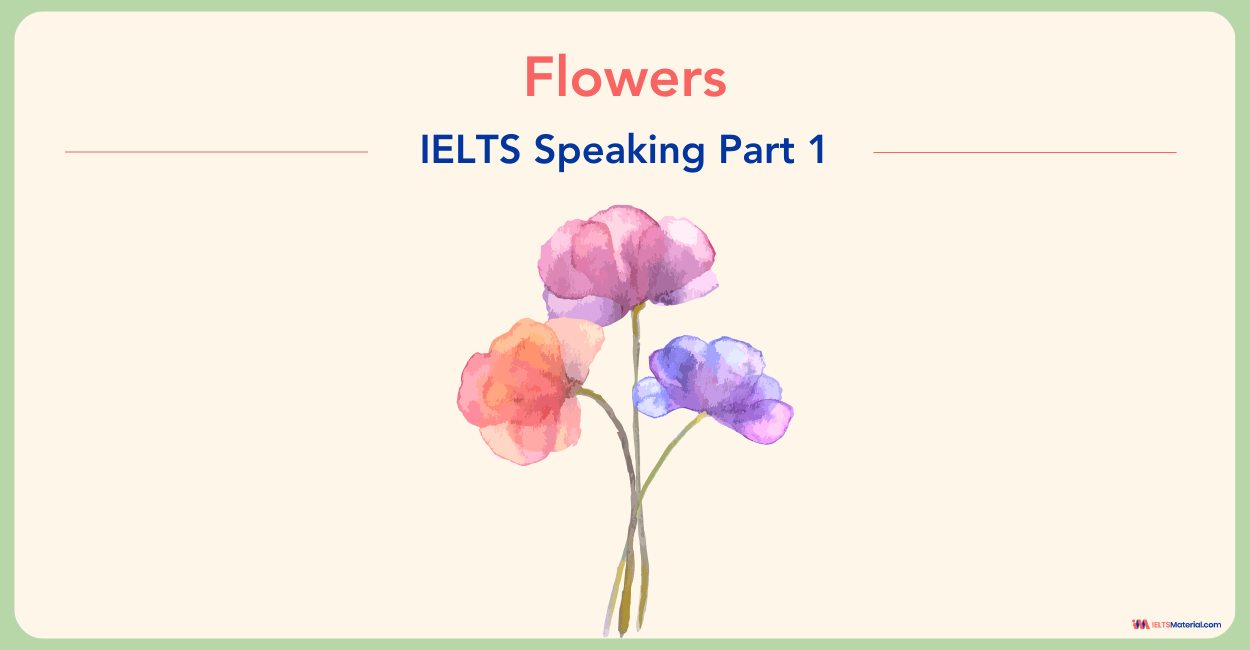
Raajdeep Saha
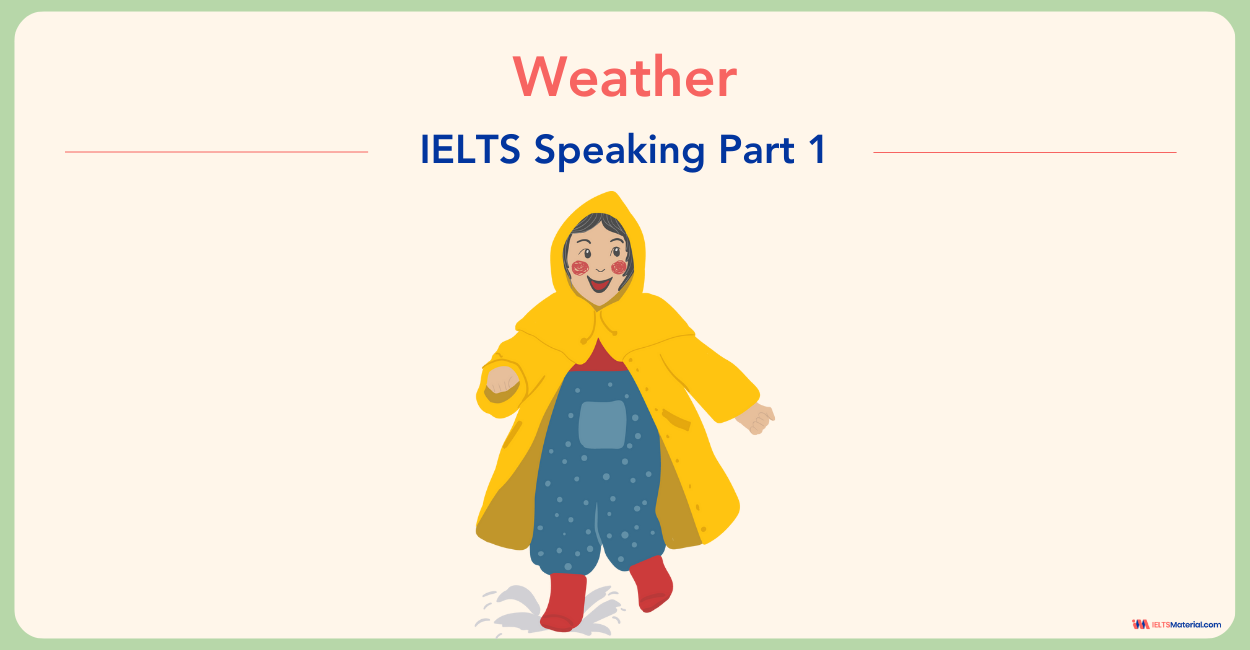
Kasturika Samanta

Post your Comments
Recent articles.
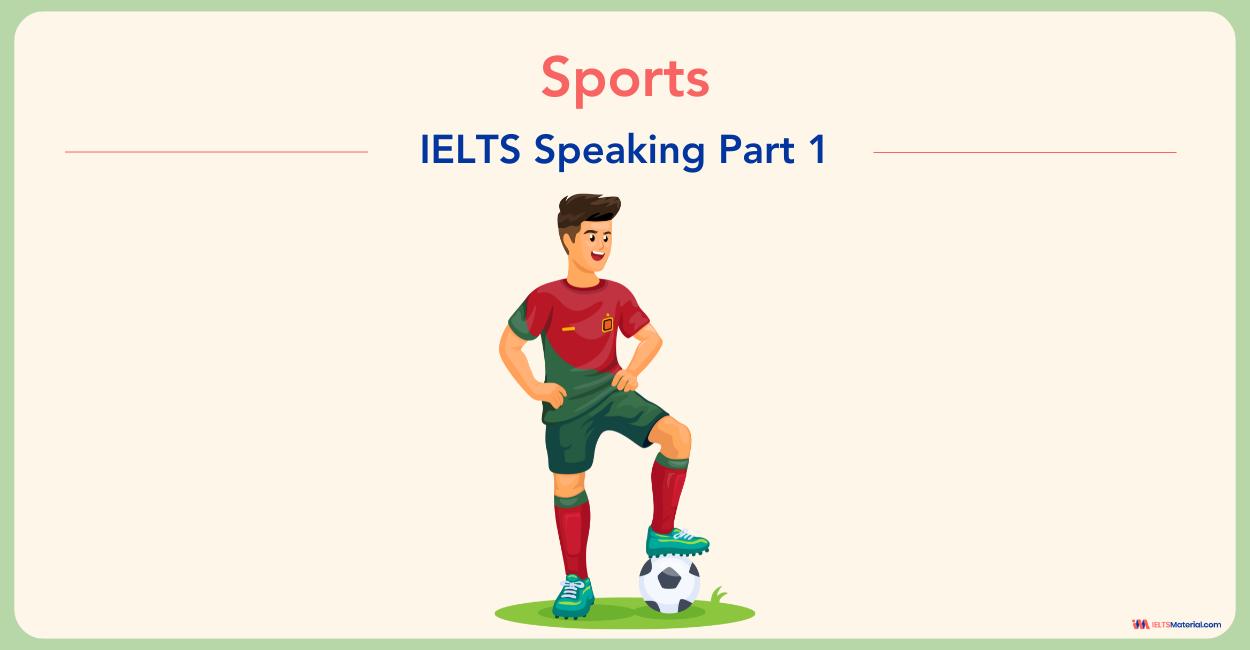
Our Offices
Gurgaon city scape, gurgaon bptp.
Step 1 of 3
Great going .
Get a free session from trainer
Have you taken test before?
Please select any option
Get free eBook to excel in test
Please enter Email ID
Get support from an Band 9 trainer
Please enter phone number
Already Registered?
Select a date
Please select a date
Select a time (IST Time Zone)
Please select a time
Mark Your Calendar: Free Session with Expert on
Which exam are you preparing?
Great Going!
How do we reinvent education? These TED Talks explore the latest thinking — from teachers, parents, kids — on how to build a better school.
Video playlists about Education

The Butterfly Effect: Talks from the TEDinArabic Summit

A love letter to science

The pursuit of curiosity and understanding

The most popular TED Talks in Hindi
Talks about education.

If you're an adult mayfly you'll probably die before the end of this video
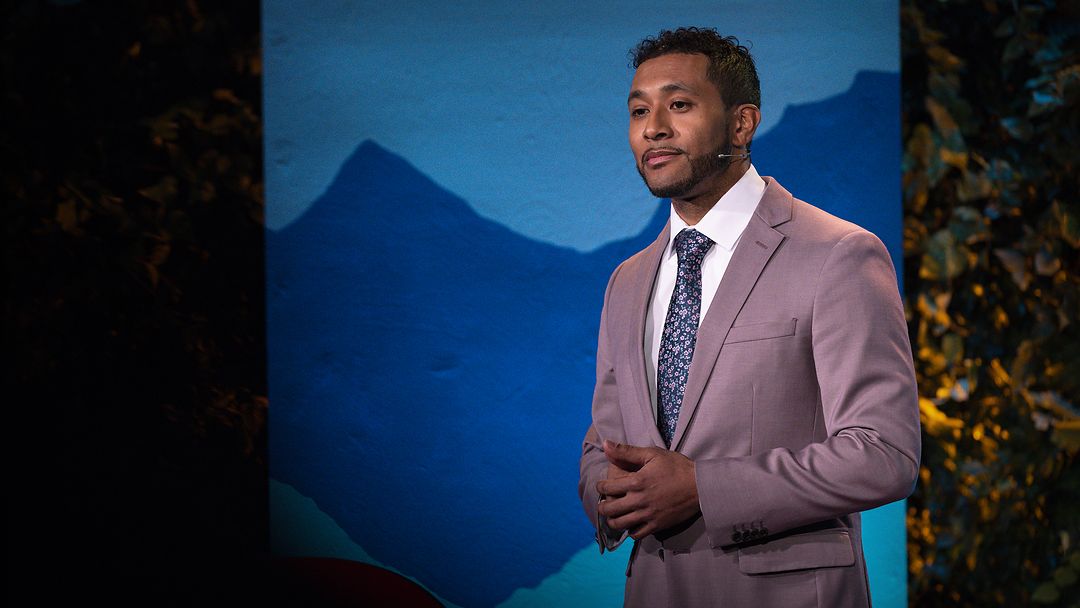
The US has a teacher shortage — here's how to fix it

How to increase your happiness
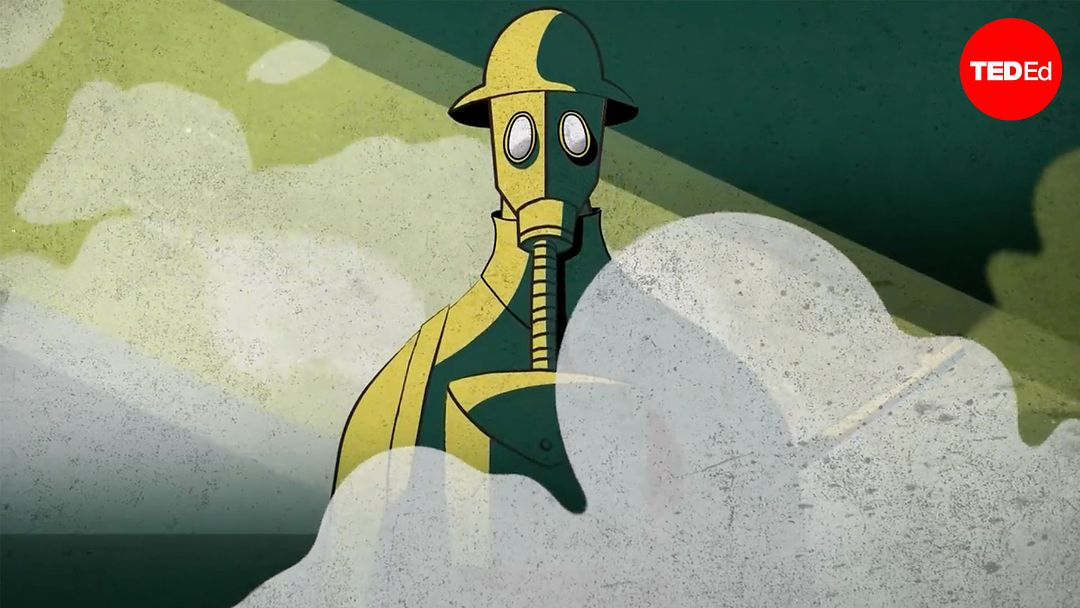
How do gas masks actually work?

The rise and fall of the Maya Empire’s most powerful city

Does math have a major flaw?

3 easy steps to build a real utopia

The Nazis recruited to win the Cold War
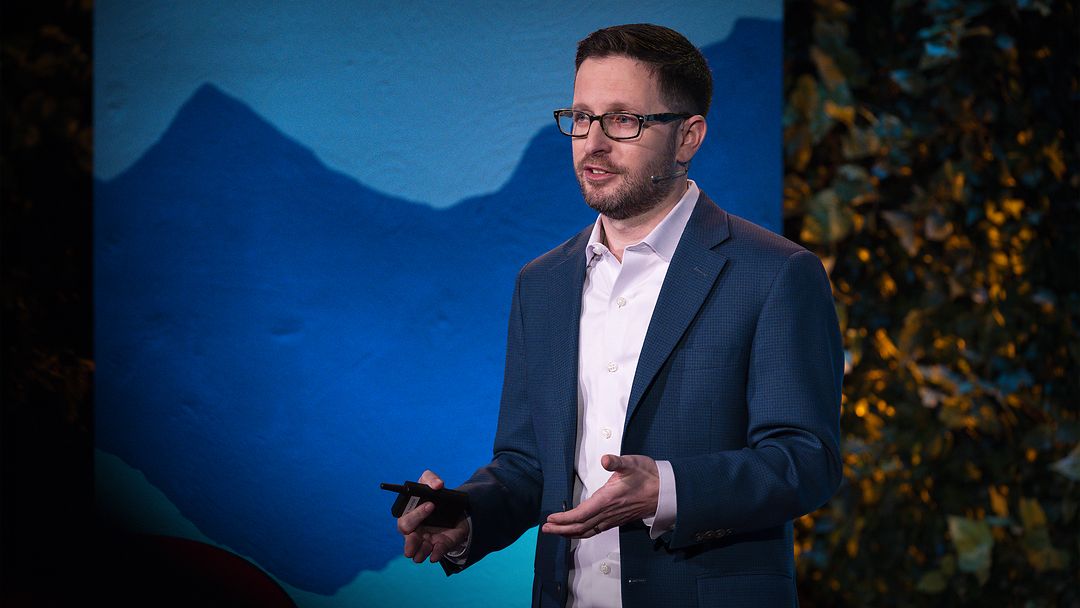
3 strategies to address the teacher shortage crisis

How to prevent political corruption

The true story behind the legend of the 47 Rōnin

This person isn't actually screaming
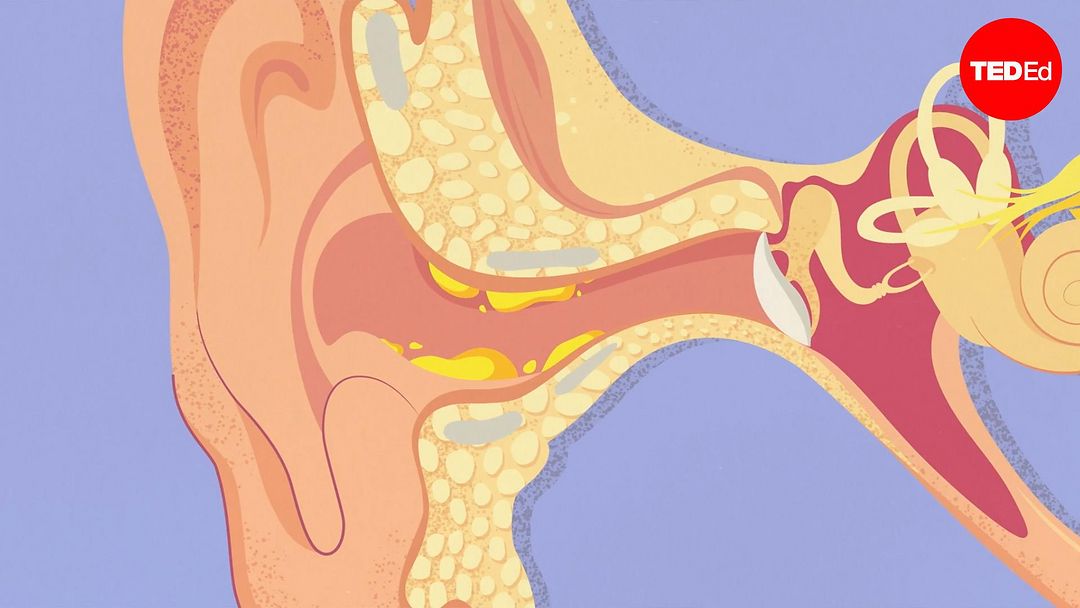
What is earwax — and should you get rid of it?

What Earth in 2050 could look like

The Greek myth of Demeter's revenge

The underground cities of the Byzantine Empire
Exclusive articles about education, even gritty people get discouraged, here’s one way to make solar energy more affordable and accessible: share it with your neighbors, how to raise emotionally intelligent kids.
- A Beginner’s Guide to IELTS
- Common Grammar Mistakes [for IELTS Writing Candidates]
Writing Correction Service
- Free IELTS Resources
- Practice Speaking Test
Select Page
IELTS Topic: Education
Posted by David S. Wills | Jun 23, 2020 | IELTS Tips | 0
In this article, I am going to tell you all about education and IELTS. As you know (if you follow this website), the best way to learn new vocabulary is to study in terms of topics . There are many IELTS topics , such as environment , space , sports , health , and crime. We have talked about education many times in the past but today I will devote a whole article to it.
I intend to look at this topic in a structured way. We will explore it as such:
- Reading & Listening
You can either study the whole lesson or else skip to the part that is most interesting for you.
Education Vocabulary
If we look at the topic of education and IELTS , we can quickly see that there is a huge amount of vocabulary to learn. In fact, this is a vast topic. I will assume that you already know the basic words like “school” and “teacher” (or else you are probably not reading this right now). Instead, I will look at some more advanced vocabulary for IELTS education.
First of all, let’s look at some school subjects.
School Subjects
There many be some regional differences in the words used for these subjects (for example, mathematics is known as “maths” in British English and “math” in American English.
Depending on where you study, most people learn a subject called “science” when they are young and later this becomes several subjects, including chemistry, biology, and physics. We also have “social sciences.” This includes many areas of study. You can read about it here .
British English vs American English
I actually wrote in depth about the differences between British and American English last year . For now, though, I will focus on the differences in language when it comes to education. Here are a few ways in which we talk about these differences.
*The British and American school systems are quite different and what is known as “secondary school” in the UK lasts for up to six years. As such, this overlaps the American version. Anyway, those final years in the UK would more likely be called “fifth/sixth form” or “fifth/sixth year,” depending on which part of the country you come from. In England, it is usually “sixth form” and in Scotland it is “sixth year.”
Some other differences
American people talk about their school years in this way:
- Freshmen (1 st year)
- Sophomore (2 nd year)
- Junior (3 rd year)
- Senior (4 th year)
In the UK, we do not commonly use these terms but in the last few decades it has become normal to talk about “freshers” as people in their first year of university. For example, they often talk about “freshers’ week” as the first week in the university year because this is when the new students arrive.
Reading and Listening
Because education is something that affects pretty much everyone in the world, it is a topic that is really common in IELTS. It could appear in any part of the test , including the reading and listening sections.
When it does occur, you should be prepared. This means that you ought to know lots of vocabulary about this topic and also have some life experience and opinions on the matter. You can achieve that by including this topic in your regular reading.
There are many ways to achieve this. You can go on Google News (or any news service that you enjoy) and subscribe to their education feed.
Let’s take an article for an example and do a little practice. We will look first at a piece called “ With no students, small college town worries over its future .” Let’s look at the first two paragraphs:
What happens to a college town when the students disappear? Ithaca, a small upstate New York city nearby gorges and vineyards, is finding out. Most of the 24,000 students at Cornell University and 6,200 more from Ithaca College effectively vanished in March when the coronavirus pandemic struck, leaving behind struggling restaurants and shops. Locals still reeling from the outbreak and resulting exodus are wondering when — or if — things will get back to normal.
It is an interesting text that deals with a familiar situation: the fallout from the Covid-19 pandemic.
In this excerpt, you can see the word “exodus.” What do you think this means? Let’s isolate that sentence:
Locals still reeling from the outbreak and resulting exodus are wondering when — or if — things will get back to normal.
We can learn from the words around it. “Resulting” tells us that this thing happened because of the virus outbreak. We also know from the previous sentence that thousands of students are not coming to this place.
We can guess then, that “exodus” means “a mass departure of people.” This sort of skill is really important when it comes to IELTS reading. You need to be able to figure out the meaning of a word from context. Here is a video that shows you how to work out the meaning of difficult vocabulary:
I have covered the topic of education here many times, including this TED video lesson about making education better by introducing creativity to curriculums. (By the way, this is one of two possible ways to pluralise “curriculum”! The other is “curricula.”)
Here is another interesting video about education. This time it is about gender and education. Remember that sometimes IELTS topics overlap like this.
IELTS Speaking Topic: Education
The topic of education is really common in IELTS speaking. In fact, it is probably one of the most common topics that there is. As such, you need to be ready to answer these sorts of questions.
As you probably know, the first part of the IELTS speaking test is comprised of relatively simple questions that you should answer with one, two, or three sentences. You don’t need to develop your answers very much here.
Here are a few sample questions:
- Do you work or are you a student?
- Why did you choose that subject?
- Did you enjoy/Do you enjoy studying at school?
- Do you study English now?
- What kind of school did you go to as a child?
- Where do you study / Where did you study?
- What do you study/did you study in university?
- What was your favourite subject as a child?
- Who was your favourite teacher?
- Do you enjoy studying alone or with friends?
You don’t need to have dazzling grammar or vocabulary skills to answer these questions. You can just give pretty basic answers. For example:
Q: Do you work or are you a student?
A: I’m studying at the moment but I also have a part-time job.
Q: Where do you study?
A: I’m studying at Shanghai Jiaotong University . The word “jiaotong” literally means “traffic” but the common translation for the name is “Shanghai Communications University.”
Q: What are you studying there?
A: I’m studying English literature at the moment but I will move onto a business course next semester and continue studying English on the side. Literature was interesting for me but I don’t think it will help my career much.
Notice that there was very little specialist vocabulary here. The only word that I used that might require explanation is “semester.” A school year is made up of two semesters. (The word “term” can also be used but different countries have different systems. In some countries, an academic year is four terms, which means that two terms make up a semester. But this is not the same everywhere.)
There are countless possible education cue cards for IELTS speaking. You might be asked to describe one of the following:
- an important memory
- the actual school you attended
The list is extremely long, but let’s look at a few possible education cue cards in more detail.
Describe a Subject
You may well be asked to describe a subject that you studied in school or that you wish you had studied. Remember that it could be your favourite subject or a subject you hated. It is always important that you read the whole cue card and do not jump to conclusions.
Here is an example:
Describe a subject you enjoyed studying at school. You should say: – when and where you started studying it – what the lessons were like – what made the subject different from other subjects and explain why you enjoyed the subject
Describe a Lesson or Project
Describing a subject presents many possibilities. You can talk about many different aspects of your chosen subject, including the classes, the books, and the teachers. However, the cue card might present you with a more specific topic, like this one:
Describe a project that you did in school with your classmates or friends. You should say: – what the project was – what it was about – how you completed it and whether you enjoyed the project or not.
Describe a Period of Time
It can be harder to answer a cue card when the thing you must talk about is a memory or period of time. These can be a real challenge because thinking of the right vocabulary and grammar is quite difficult. When you are presented with this sort of question, you might have to be a little creative with your answers. Here is another example cue card:
Describe a period of time from your studies that was the most difficult for you so far. You should say: – when it was – why was it hard – what you were doing at that time and whether you felt you were successful in overcoming the difficulties.
Describe a Teacher
Finally, we come to the obvious IELTS speaking cue card: describe a teacher . This is definitely a common cue card and also quite an easy one. I think that most people who sit IELTS should be comfortable describing people like teachers. If you are not, you should look at my other lessons on how to describe people. You may also find this article about the good qualities teachers possess to be helpful.
There are lots of different ways that this could be phrases. It could be a teacher who influenced you, a teacher you liked, a teacher who helped you, your favourite teacher… and so on. There are numerous possibilities. But here is one example:
Describe a teacher from the past whom you remember. You should say: – what subject the teacher taught you – how old you were then – what were some special characteristics of this teacher and explain why you remember this teacher.
Of course, there are also lots of possible questions about education for part three of the speaking exam. In this section, you will most likely be asked questions like “are men and women equally capable of teaching?” and “should boys and girls be forced to take the same lessons?” The issues of gender , age, and other social issues will often intersect with the main topic.
Here are a few examples:
- What are some essential qualities every teacher should have?
- How are education priorities today different from those in the past?
- How well do you think schools should prepare young people for working life?
Education and IELTS Writing
When it comes to task 2 of the IELTS writing test, education is also a really common topic. Again, there are countless possible questions you could be given, so rather than prepare for any single question, it is better to build your skill in dealing with this topic.
You should be familiar with the vocabulary given at the start of this lesson and also with ideas about education on a global scale. It is ok to have different opinions from other people, but you should be aware of all sides of these issues.
Keep in mind that education does not just mean “school” or “university.” It involves much more: teaching, learning, childhood, adulthood, books, reading, etc. It could be about community colleges or distance learning. Do not be surprised by these questions and do not think that you can handle this topic just because you are comfortable talking about high school. There is much more to it than that.
Here, I will give you four sample band 9 answers to typical IELTS writing questions. Two are from task 2 and two are from task 1, both general and academic tests.
Question #1
Many businesses think that the new employees who have just graduated from schools lack interpersonal skills, such as working with colleagues as a team.
What has caused this and what are the solutions to this problem?
Sample Band 9 Answer
It is claimed by some business owners and recruiters that graduates nowadays tend to lack interpersonal skills. This essay will first explore why this is the case, before then suggesting how it may be remedied.
If it is true that graduates now lack the interpersonal skills necessary to succeed in the modern workplace, then that surely can be blamed on the exceptionally high level of theoretical knowledge necessary to achieve a good degree. As universities have become more competitive, the requirements for achieving a degree have gotten much more stringent, and students are required to spend all their time reading books and preparing for difficult assessments. It seems likely that this hinders their opportunities to socialize or work with others on productive tasks.
Solving this problem should not be terribly difficult. In fact, university faculties should pay attention to these complaints and implement solutions into their courses. Perhaps the most obvious suggestion is that students must be required to participate in more group activities throughout their education. For example, rather than studying all day and night to write an essay or sit an exam, students could be asked to prepare a group presentation together with their peers. Ideally, these groups should be picked at random to ensure that students develop the necessary skills to work with others whom they would not have previously chosen to work.
In conclusion, it appears that universities are failing students by not educating them in how to develop their interpersonal skills, and as a result they are struggling in the workplace. These universities should thus require students to develop their communicative abilities through specific group-based tasks.
Question #2
Some people think that a sense of competition in children should be encouraged. Others believe that children who are taught to co-operate rather than compete become more useful adults.
Discuss both these views and give your own opinion.
People disagree over how to raise their kids, with many parents and teachers suggesting that competition is detrimental to their development. They think that children should be taught cooperation instead. This essay will look at both views, before deciding that these need not be mutually exclusive.
The argument against competition in children essentially revolves around the idea that it is unhealthy for children to be pitted against one another. Rather than teaching them to compete, these people argue, we should teach them to work together. Natural selection dictates that some children will invariably be winners while others will be losers, and in the modern era, this seems like an out-dated concept. All children should be winners.
On the other hand, competition is a part of life and therefore children should be exposed to it from the beginning. It needn’t be unfair, of course. When children are taught healthy attitudes towards competition – such as sportsmanship – then it is actually tremendously beneficial for them. They can learn how to participate in natural activities and then deal healthily with the result, whether that is victory or loss.
However, it seems to me that there is no real distinction between competition and cooperation. Team sports, after all, involve both these elements. If children play football, basketball, or rugby, then they will work with their teammates to compete against another team. In the end, both aspects are learned.
In conclusion, there is no need to separate competition from cooperation, and neither should be removed from a child’s education or environment. Both are important for child development.
Question #3
You recently did a short cookery course. The cookery school has asked for your feedback on this course.
Write a letter to the course director at the cookery school. In your letter
- describe what you enjoyed about the course
- say how much cooking you have done since the course
- suggest another cookery course you’d like the school to offer
Dear Sir or Madam,
I am writing in response to your request for feedback on the cookery course I recently attended. I am happy to give you some of my thoughts on the course.
First of all, I really enjoyed it. I had wanted to study French cooking techniques for several years and so I was really excited to see that this course became available. It certainly did not disappoint me, and I was delighted by the processes that I learned during that amazing week.
Since the course, I have been cooking and baking for my friends and family at every opportunity. They have been really impressed with my newfound skills, and I will continue to practice what I have learned.
As for suggestions, I do think that it would be worth adding some other sorts of cuisine to the courses on offer. I would love to learn how to cook Thai food, for example.
David S. Wills
Question #4.
There is a bar chart and a pie chart containing information taken from a survey on adult education. The bar chart describes why adults go into education and the pie chart shows who the respondents think should pay for it. People mostly go into education out of interest, and, perhaps unsurprisingly, it is believed that they should pay for it themselves.
According to the data, forty percent of adults go into education due to some sort of interest in a particular subject, while thirty-eight percent do it to gain qualifications. These are far and away the most common reasons, as the next most frequently cited reason was almost half this value. Several reasons were picked by about twenty percent of people, including the fact that it may help them earn a promotion at work. The least frequently stated answer was that adult education is a good way to meet new people.
The survey results showed forty percent of people believe the individual should pay the costs of a course. This matches quite well with the previous data, as the same percentage of people did these courses purely out of interest.
About The Author
David S. Wills is the author of Scientologist! William S. Burroughs and the 'Weird Cult' and the founder/editor of Beatdom literary journal. He lives and works in rural Cambodia and loves to travel. He has worked as an IELTS tutor since 2010, has completed both TEFL and CELTA courses, and has a certificate from Cambridge for Teaching Writing. David has worked in many different countries, and for several years designed a writing course for the University of Worcester. In 2018, he wrote the popular IELTS handbook, Grammar for IELTS Writing and he has since written two other books about IELTS. His other IELTS website is called IELTS Teaching.
Related Posts
How to Write a Thank You Letter [IELTS General]
October 28, 2020
Describe a Shop [IELTS Speaking]
July 13, 2020
Describe a Person Who Influenced You
May 30, 2022
Improvements to Writing Correction Service
May 11, 2020
Leave a reply Cancel reply
Your email address will not be published. Required fields are marked *
This site uses Akismet to reduce spam. Learn how your comment data is processed .
Download my IELTS Books
Recent Posts
- How to Improve your IELTS Writing Score
- Past Simple vs Past Perfect
- Complex Sentences
- How to Score Band 9 [Video Lesson]
- Taxing Fast Food: Model IELTS Essay
Recent Comments
- Francisca on Adverb Clauses: A Comprehensive Guide
- Mariam on IELTS Writing Task 2: Two-Part Questions
- abdelhadi skini on Subordinating Conjunction vs Conjunctive Adverb
- David S. Wills on How to Describe Tables for IELTS Writing Task 1
- anonymous on How to Describe Tables for IELTS Writing Task 1
- Lesson Plans
- Model Essays
- TED Video Lessons
- Weekly Roundup

IELTS speaking vocabulary about school and education
Home » IELTS speaking » IELTS speaking vocabulary about school and education
You may be asked questions about school and education in general. Read the following IELTS style question and answers below and pay attention to the words or phrases in bold. Use the ‘definitions’ section at the bottom of the page to check any meanings you are unfamiliar with.
Make a note of any new vocabulary and the best way to learn it is to use it!
IELTS speaking part 1 – style questions
Examiner: What did you enjoy most when you were at school?
Janet: School feels like a long time ago now, as I am currently at University, but I do remember really enjoying English lessons. We were lucky enough to have a native speaking teacher, which was usual, but it gave us the opportunity to be inspired by hearing authentic pronunciation and our teacher told very funny stories to keep us focused.
Examiner: Do you think a teacher should be friendly or strict?
Alexa: When I was at school, our teachers were ‘old-school’, strict and very traditional, so our lessons were teacher centred. As children we were not encouraged to ask questions or voice our opinions. However, today, thankfully, classes are more student centred, and encourage collaboration and I think a more friendly teacher would be more successful here.
Examiner: What’s the most difficult part of your study now?
Kamila: Well, for the most part, I’d say it’s encourage collaboration. I mean there are so many assignments , and students are always under a lot of pressure to meet deadlines. I am lucky as I don’t find exams too overwhelming. If you are well prepared, they are entirely predictable , and I can pretty much sail through them with only a bit of revision.
IELTS speaking part 2 – style question
Describe a subject you enjoyed studying at school.
You should say:
- when and where you started studying it
- what lessons were like
- what made it different from other subjects
and explain why you enjoyed the subject.
Said: To be honest, I found school pretty challenging for a number of reasons. We moved house quite often back then, so I had to adapt to different teachers, learning expectations and to make new friends. However, the subject which I was always passionate about and determined to succeed in was French.
I started lessons when I was quite young, which is common in the UK, as learning languages is actively encouraged, but the standard and expectation was relatively low so lessons revolved around role plays asking for ice cream or bread! Our lessons involved a lot of writing and dictation which was hard, and I did struggle to see the point of this as what I really wanted to learn was how to communicate and be understood. Our vocabulary was based around the family, food, travel and school so It was quite useful but not the sort of things that children really want to talk about.
I was motivated as I had already visited France on holiday and so I could see for myself the possible benefits of being able to communicate and make myself understood. The breakthrough for me came when I was around 15 with a teacher called Mrs. Green.
She was half French herself, so she spoke beautifully and was rather glamourous too and her lessons were filled with laughter, games and stories although she was very strict as well. We were all expected to study hard and to succeed in exams. She was inspiring though because she loved her subject.
Personally, I have always enjoyed listening to languages, to the i ntonation and sound even if I do not understand. Once I could use the French I had learnt in school when I visited France and later studied there, the language came alive and all that hard work as a youngster paid off !
IELTS speaking part 3 – style question
Examiner: Do you think single sex schools are still relevant in today’s world?
Emilie: While today many would argue that traditional schools which only allow either girls or boys to study there seem rather outdated and old fashioned as this is not how ‘real’ society of the workplace operates. However, many league tables which rank schools in order of high exam results, have proved that single sex schools can be much better as there are less distractions and maybe students are more able to focus on learning and be proud of their achievements without having to compete with the opposite sex.
Examiner: What are the benefits of a boarding school?
Helene: As an alumni of a boarding school , I can see the upsides as well as the challenges. In some countries children as young as 8 are sent away to school, either because of the higher standard of education on offer, or because their parents may be working overseas.
Many of these schools offer a wide range of e xtra-curricular activitie s such as golf, photography or fashion as well as the core academic subjects. Children usually speak of forming lifelong friendships, with their peer group as well as teachers and there is a strong concept of shared experiences.
Examiner: What are the advantages of studying a distance learning course?
Lydia: For many people, especially students who work or need more flexibility, distance or remote learning is the ideal way to study. There are several benefits that immediately come to mind. Not only the cost, which is far less than it would be to attend a college with high tuition fees but the ability to study at your own speed.
It is usually agreed that some find that this method of learning suits them better than sitting in lectures or going to tutorials which demands more self-motivation and discipline.
Vocabulary words related to education and definitions:
- authentic: real, true
- old-school strict: traditional learning with punishments and controlling teachers
- teacher centred : where the teacher is leading the class
- encourage collaboration: learning together through discussions
- pressure to meet deadlines: having to finish work by a certain time / date
- assignments: homework or essays
- sail through them: not to have to work hard and to find things easy
- learning expectations: what the teacher expects from their student
- role plays : acting out a situation to simulate or practice it
- dictation: writing down what the teacher says, accurately and fast.
- breakthrough: a new development
- inspiring: something which makes you want to do better
- intonation: the ‘singing’ sound of speech
- paid off: was worth the effort
- outdated: old fashioned
- league tables: tables which rank the position of schools according to academic success
- alumni: students who used to go to a certain school or college
- boarding school: where students live at school during the term time
- extra- curricular activities: anything NOT academic, eg sport, drama
- peer group : students of your own age, in your class
- remote: not being physically there / learning via computer
More IELTS vocabulary tutorials to help you prepare for your IELTS exam :
- Vocabulary about climate change
- Vocabulary about fashion and shopping
- Vocabulary about advertising
- Vocabulary about social media
- Vocabulary about food and nutrition
- Vocabulary about family and friends
- Vocabulary about sport
- Vocabulary about the Coronavirus
Audio tutorial
You can download or listen to the audio version here:
| Direct Download Here | Stitcher | iTunes | Spotify | Soundcloud | Transcript |
Podcast: Play in new window | Download
Subscribe: RSS
- Free Essay Band Score Evaluation
- Sign up to claim your free IELTS materials
- Jump to Band 7 or it’s Free
- IELTS Writing Evaluation
- IELTS Band Score Calculator
- Book Your Online IELTS Test
- Sample Topic Answers
- Useful Sentences
- Sample Task 2 Questions 2022
- Introduction to Paraphrasing
- Model Band 9 Essay
- Five Band 9 Words
- Model Band 7 Essay
- Differences Band 9 vs Band 7 Essay
- Band 6.5 Essay
- Academic Collocations
- Topic Sentences
- Discuss Both Views
- Tutorial: To What Extent Essays
- Paraphrasing Introductions
- Essay Structures
- Essay Plans
- Describe a Pie Chart
- Using Percentages
- Map Vocabulary
- Describe Flow Charts
- Describe a Bar Chart
- How to get Band 9
- AT 1 Sample Questions 2022
- Describe a Graphic
- GT Task 1 Questions 2022
- IELTS Vocabulary
- Google Play / Podcasts
- Apple Podcast
- Android App
- Task 2 Sample Questions
- AT 1 Questions
Company addresses: HK Office: BW ENGLISH SERVICES HK Ltd, Unit 2512, 25/F, Langham Place Office Tower, 8 Argyle Street, Mongkok, Hong Kong UK Office: BW ENGLISH SERVICES, 120 High Road, East Finchley, N29ED, London, England, United Kingdom +44 20 3951 8271 ($1/min).


Want a daily email of lesson plans that span all subjects and age groups?
Subjects all subjects all subjects the arts all the arts visual arts performing arts value of the arts back business & economics all business & economics global economics macroeconomics microeconomics personal finance business back design, engineering & technology all design, engineering & technology design engineering technology back health all health growth & development medical conditions consumer health public health nutrition physical fitness emotional health sex education back literature & language all literature & language literature linguistics writing/composition speaking back mathematics all mathematics algebra data analysis & probability geometry measurement numbers & operations back philosophy & religion all philosophy & religion philosophy religion back psychology all psychology history, approaches and methods biological bases of behavior consciousness, sensation and perception cognition and learning motivation and emotion developmental psychology personality psychological disorders and treatment social psychology back science & technology all science & technology earth and space science life sciences physical science environmental science nature of science back social studies all social studies anthropology area studies civics geography history media and journalism sociology back teaching & education all teaching & education education leadership education policy structure and function of schools teaching strategies back thinking & learning all thinking & learning attention and engagement memory critical thinking problem solving creativity collaboration information literacy organization and time management back, filter by none.
- Elementary/Primary
- Middle School/Lower Secondary
- High School/Upper Secondary
- College/University
- TED-Ed Animations
- TED Talk Lessons
- TED-Ed Best of Web
- Under 3 minutes
- Under 6 minutes
- Under 9 minutes
- Under 12 minutes
- Under 18 minutes
- Over 18 minutes
- Algerian Arabic
- Azerbaijani
- Cantonese (Hong Kong)
- Chinese (Hong Kong)
- Chinese (Singapore)
- Chinese (Taiwan)
- Chinese Simplified
- Chinese Traditional
- Chinese Traditional (Taiwan)
- Dutch (Belgium)
- Dutch (Netherlands)
- French (Canada)
- French (France)
- French (Switzerland)
- Kurdish (Central)
- Luxembourgish
- Persian (Afghanistan)
- Persian (Iran)
- Portuguese (Brazil)
- Portuguese (Portugal)
- Spanish (Argentina)
- Spanish (Latin America)
- Spanish (Mexico)
- Spanish (Spain)
- Spanish (United States)
- Western Frisian
sort by none
- Longest video
- Shortest video
- Most video views
- Least video views
- Most questions answered
- Least questions answered

A brief history of Spanish
Lesson duration 05:22
392,674 Views

Abraham Lincoln's Gettysburg Address
Lesson duration 02:49
2,469,828 Views

What makes a language... a language?
Lesson duration 04:57
753,161 Views

Who decides what’s in the dictionary?
Lesson duration 05:23
420,394 Views

This tool will help improve your critical thinking
Lesson duration 05:20
6,021,434 Views

How would you finish the sentence, “Imagine if…”?
Lesson duration 01:30
242,962 Views

Why do we, like, hesitate when we, um, speak?
Lesson duration 05:34
2,213,418 Views

Using your voice is a political choice - Amanda Gorman
Lesson duration 07:20
393,149 Views

Letter from Birmingham Jail - Martin Luther King, Jr.
Lesson duration 48:39
673,278 Views

We can help you master public speaking
Lesson duration 04:30
364,481 Views

10 ways to have a better conversation - Celeste Headlee
Lesson duration 11:45
14,027,971 Views

The myth of the stolen eyeballs
Lesson duration 05:30
1,370,265 Views

How do our brains process speech?
Lesson duration 04:54
397,675 Views

How to disagree productively and find common ground - Julia Dhar
Lesson duration 14:57
353,466 Views

The tale of the boy who tricked the Devil
Lesson duration 05:26
5,394,076 Views

What do all languages have in common?
Lesson duration 05:19
792,763 Views

‘th’ ‘f’ ‘v’ are often confused | Learn how to use speech therapy
Lesson duration 01:37
387,252 Views

Sticky i | Learn to read | Ci Si and Ti sounds
Lesson duration 01:02
1,070,964 Views

This-song to teach the sight word "this"
Lesson duration 01:25
260,581 Views

Digraphs | Phonics song for children | Phonemic awareness
Lesson duration 03:59
6,061,862 Views

Word family -at | Phonics song for kids
Lesson duration 03:34
4,546,967 Views

Lesson duration 05:08
13,542,220 Views

Super E (silent E hip hop song for kids)
Lesson duration 03:18
643,127 Views

SH | fun phonics | how to read
Lesson duration 01:29
1,769,298 Views
10 Tips for Improving Your Public Speaking Skills
Few are immune to the fear of public speaking. Marjorie North offers 10 tips for speakers to calm the nerves and deliverable memorable orations.
Marjorie North
Snakes? Fine. Flying? No problem. Public speaking? Yikes! Just thinking about public speaking — routinely described as one of the greatest (and most common) fears — can make your palms sweat. But there are many ways to tackle this anxiety and learn to deliver a memorable speech.
In part one of this series, Mastering the Basics of Communication , I shared strategies to improve how you communicate. In part two, How to Communicate More Effectively in the Workplace , I examined how to apply these techniques as you interact with colleagues and supervisors in the workplace. For the third and final part of this series, I’m providing you with public speaking tips that will help reduce your anxiety, dispel myths, and improve your performance.
Here Are My 10 Tips for Public Speaking:
1. nervousness is normal. practice and prepare.
All people feel some physiological reactions like pounding hearts and trembling hands. Do not associate these feelings with the sense that you will perform poorly or make a fool of yourself. Some nerves are good. The adrenaline rush that makes you sweat also makes you more alert and ready to give your best performance.
The best way to overcome anxiety is to prepare, prepare, and prepare some more. Take the time to go over your notes several times. Once you have become comfortable with the material, practice — a lot. Videotape yourself, or get a friend to critique your performance.
Communication Strategies: Presenting with Impact
Search all Communication programs.
2. Know Your Audience. Your Speech Is About Them, Not You.
Before you begin to craft your message, consider who the message is intended for. Learn as much about your listeners as you can. This will help you determine your choice of words, level of information, organization pattern, and motivational statement.
3. Organize Your Material in the Most Effective Manner to Attain Your Purpose.
Create the framework for your speech. Write down the topic, general purpose, specific purpose, central idea, and main points. Make sure to grab the audience’s attention in the first 30 seconds.
4. Watch for Feedback and Adapt to It.
Keep the focus on the audience. Gauge their reactions, adjust your message, and stay flexible. Delivering a canned speech will guarantee that you lose the attention of or confuse even the most devoted listeners.
5. Let Your Personality Come Through.
Be yourself, don’t become a talking head — in any type of communication. You will establish better credibility if your personality shines through, and your audience will trust what you have to say if they can see you as a real person.
6. Use Humor, Tell Stories, and Use Effective Language.
Inject a funny anecdote in your presentation, and you will certainly grab your audience’s attention. Audiences generally like a personal touch in a speech. A story can provide that.
7. Don’t Read Unless You Have to. Work from an Outline.
Reading from a script or slide fractures the interpersonal connection. By maintaining eye contact with the audience, you keep the focus on yourself and your message. A brief outline can serve to jog your memory and keep you on task.
8. Use Your Voice and Hands Effectively. Omit Nervous Gestures.
Nonverbal communication carries most of the message. Good delivery does not call attention to itself, but instead conveys the speaker’s ideas clearly and without distraction.
9. Grab Attention at the Beginning, and Close with a Dynamic End.
Do you enjoy hearing a speech start with “Today I’m going to talk to you about X”? Most people don’t. Instead, use a startling statistic, an interesting anecdote, or concise quotation. Conclude your speech with a summary and a strong statement that your audience is sure to remember.
10. Use Audiovisual Aids Wisely.
Too many can break the direct connection to the audience, so use them sparingly. They should enhance or clarify your content, or capture and maintain your audience’s attention.
Practice Does Not Make Perfect
Good communication is never perfect, and nobody expects you to be perfect. However, putting in the requisite time to prepare will help you deliver a better speech. You may not be able to shake your nerves entirely, but you can learn to minimize them.
Find related Communication programs.
Browse all Professional & Executive Development programs.
About the Author
North is a consultant for political candidates, physicians, and lawyers, and runs a private practice specializing in public speaking, and executive communication skills. Previously, she was the clinical director in the department of speech and language pathology and audiology at Northeastern University.
Why Gender Equity in the Workplace is Good for Business
Research indicates a correlation between gender equity and organizational success, yet it also points to obstacles for women in leadership.
Harvard Division of Continuing Education
The Division of Continuing Education (DCE) at Harvard University is dedicated to bringing rigorous academics and innovative teaching capabilities to those seeking to improve their lives through education. We make Harvard education accessible to lifelong learners from high school to retirement.

- Practice Test
- Useful Tips – Tricks
- Full Writing Review
- General Writing Task
- Writing Task 1
- Writing Task 2
- Writing Exercises
- Writing Sample – Topics
- Writing Vocabulary
- Speaking Vocabulary
- Intro Question
- Speaking Part 1
- Speaking Part 2
- Speaking Part 2 – Audio
- Speaking Part 3
- IELTS Books
- Recent Exams
- IELTS Vocabulary
- Essay from Examiners
- IELTS Ideas
IELTS App - For Mobile
Ready for the IELTS exam with our IELTS app. Over 2 million downloads

Popular Last 24h
Ielts speaking part 1 topic: celebrities/ superstars – answers with audio, describe something difficult you would like to succeed in doing, talk about something you were disappointed about., listening full test 10 - section 3, ielts speaking part 3: volunteer work, writing task 1: the percentage of households that owned rented accommodation, writing task 1: population figures for india and china since the year 2000 and predicted population growth up until 2050.
- IELTS Test/Skills FAQs
- IELTS Scoring in Detail
- Forecast Speaking – 2023
- List IELTS Speaking Part 3
- List IELTS Speaking Part 1
- IELTS Writing 2023 – Actual Test
Our Telegram
Join our community for IELTS preparation and share and download materials.
The information on this site is for informational purposes only. IELTS is a registered trademark of the University of Cambridge ESOL, the British Council, and IDP Education Australia. This site and its owners are not affiliated, approved or endorsed by University of Cambridge ESOL, the British Council, or IDP Education Australia.
Latest Articles
Writing task 2: governments – environmental, writing task 2: topic education, writing task 1: average number of hours students, writing task 1: internet use for different purposes in australia, most popular, describe a film that made you laugh, describe a person whom you met for the first time and made you happy, topic: experience is the best teacher, in many countries,today there are many highly qualified graduates without employment..
ieltspracticeonline All Rights Reserved

IELTS Speaking Lesson about Education
👇 take this lesson with you 👇, table of contents, ielts speaking vocabulary: education.
Fill in the gap with one word
- Next week I am going to _____ the IELTS test .
- At school you will get into trouble if you don’t _________ the rules
See answers
- Next week I am going to take / sit / re-sit / re-take / pass the IELTS test.
The examiner gives the test Cambridge English write the test
- To pass = to succeed
2. At school you will get into trouble if you don’t _ follow / obey / respect / stick to / keep to / abide by the rules
IELTS Speaking: Schools
Curriculum (n.)
Curricula (n.) Plural = subjects / lessons in a course
- What do we call classes we do after school?
Extra curricular activities After school activities
Tests and Exams
- I am going to _______ the IELTS test
- sit / take
- pass = succeed
- fail = not to pass
- re-sit / re-take / re-do = do / take again
- To pass with flying colours = to pass with a really high score
- To pass with merit = to pass very well
- To pass with (a) distinction = to pass at the highest level
- To flunk a test = to fail a test
- I sailed through the test = it was easy
- It was a breeze = it was really easy
Discipline (v.) (n.) = control, order, authority
- Our form teacher would keep us in line = keep control over us
- She was a no-nonsense teacher =doesn’t accept silly behaviour
- Strict (adj.) = keeps strong control
The opposite of strict is ______ ?
- Easy-going
- Laid-back
“ Rules are there to be broken!”

_____ the rules
- Follow _____
- Stick to _____
- Keep to _____
- Break _____
Punishment
- Detention = when you stay behind after class
- Writing lines = writing the same line 100 times
- Suspension = when you cannot go to school for a few days
- Expulsion = when you are kicked out of the school or to expelled from school
- Corporal punishment = hitting the student (caning, giving the slipper, slapping with a ruler)
- knowledgeable
- well-read = s.o. who reads a lot
- tough but fair
- easy-going = relaxed
- nurturing = encouraging
- ill-prepared = badly prepared
- rambling = talking too much without a goal
- inept = not competent, not good
All of the following can be used to describe a teacher who treats some students well and others badly.
- discriminating
- guilty of favouritism
IELTS Speaking: Learning
Bloom’s Taxonomy
This is a pyramid of learning levels.
The bottom level is the lowest level of learning, and the top one is the highest level of learning.
To learn deeply, you need to try and do activities that will move you up the levels.
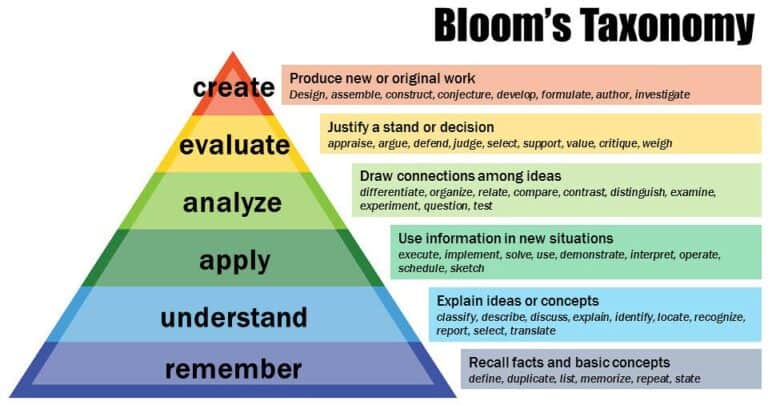
If you are a teacher, find out more about how to use Bloom’s Taxonomy here
The table below shows you the kind of activities you can do to move up the learning levels.
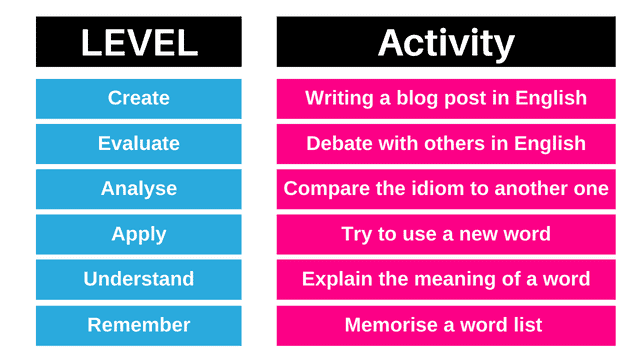
The table below shows you some useful phrases you can use to talk about learning in your IELTS Speaking test .
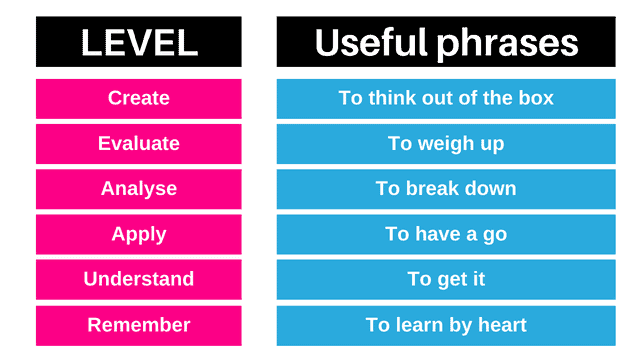
IELTS Speaking: Listening task
IELTS Speaking: Listening Task
Click here to listen.
At school, I had a teacher who just used to make us [1] _______ everything by heart. I didn’t enjoy it that much, but sometimes we had to have a [2] ____ at using those ideas in a [3] ________, and I felt that was much more beneficial. You know, [4] _________ up other people’s ideas, and thinking out of the [5] ________, I found that really useful.
At school I had a teacher who just used to make us [1] learn everything by heart. I didn’t enjoy it that much, but sometimes we had to have a [2] go at using those ideas in a [3] debate , and I felt that was much more beneficial. You know, [4] weighing up other people’s ideas, and thinking out of the [5] box , I found that really useful.
What is the impact of technology on education?
Here are some ideas phrases you can use to talk about this.
Good or Positive Impact
- We have more access to resources and information worldwide
- Technology can create shortcuts (=a way to do things more quickly)
- Learn more quickly
- It has led to personalised learning
- Motivate young people in particular
- Unleash our creativity
Bad or Negative Impact
- It can put older people off
- It can be frustrating
- It can fail
- It can be distracting
To put someone off something = to discourage someone from doing it
With this question you can also consider the impact on different groups of people.
- Old People
It can be off-putting It can make learning daunting or overwhelming
Make it fun They are digital natives, so it’s easy to use
There’s pressure to keep up with the latest changes There’s a steep learning curve

Free IELTS Speaking Course!
Improve your Part 1 answers with my new, short online course
Crack IELTS Speaking: Part 1

Ideal for beginners and veterans of IELTS Speaking!
Click here to enroll now!
More Free Lessons
If you liked this lesson, leave a comment below!
There are more lessons you can follow in the links below too.
DAILY ROUTINES in IELTS Speaking. Vocabulary and idioms you need to describe about your daily routines.
ENVIRONMENT in IELTS Speaking Learn different ways to protect our environment and discuss it with idioms and vocabulary in this lesson.
MEDICINE in IELTS Speaking Learn the COVID Vocabulary for IELTS Speaking and talk about Alternative Medicines using idioms and vocabulary.
SKILLS in IELTS Speaking Learn the collocations and adjectives to talk about skills we learn and need.
Leave a Reply Cancel reply
Your email address will not be published. Required fields are marked *
Save my name, email, and website in this browser for the next time I comment.
Speak Better English
Free resources.
- Useful Tools
- Vocabulary Guide
- Pronunciation Guide
- Study Guides
- YouTube Channel
IELTS Speaking Test Info
- Profile on LinkedIn
- Privacy Policy
Privacy Overview
Get your pdf now.
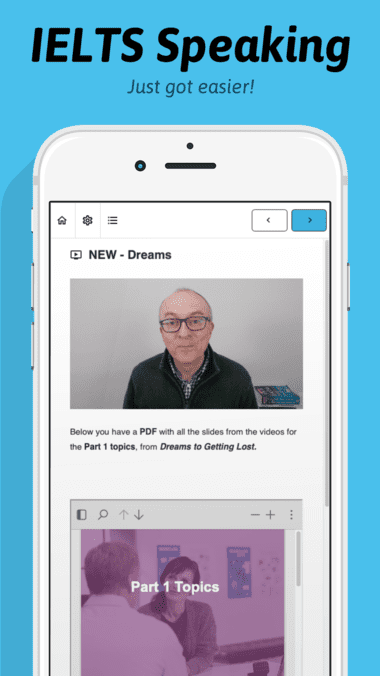
Better English
Better answers, higher score, try my online course, ielts speaking success - get a band 7+ gold.

- Entrepreneur(n) – a person who starts a business.
- Vital (adj) – very important/needed.
- Tough (adj) - difficult.
- A multitude of (n) - very many.
- One in a million (p) – very rare/unusual.
- To possess (v) - to have (formal).
- To assess (v) – To make a judgement about something.
- Sought after (adj) – wanted by many people.
- Curriculum (n) – the courses taught at a school or university.
- To illustrate (v ) – to show.
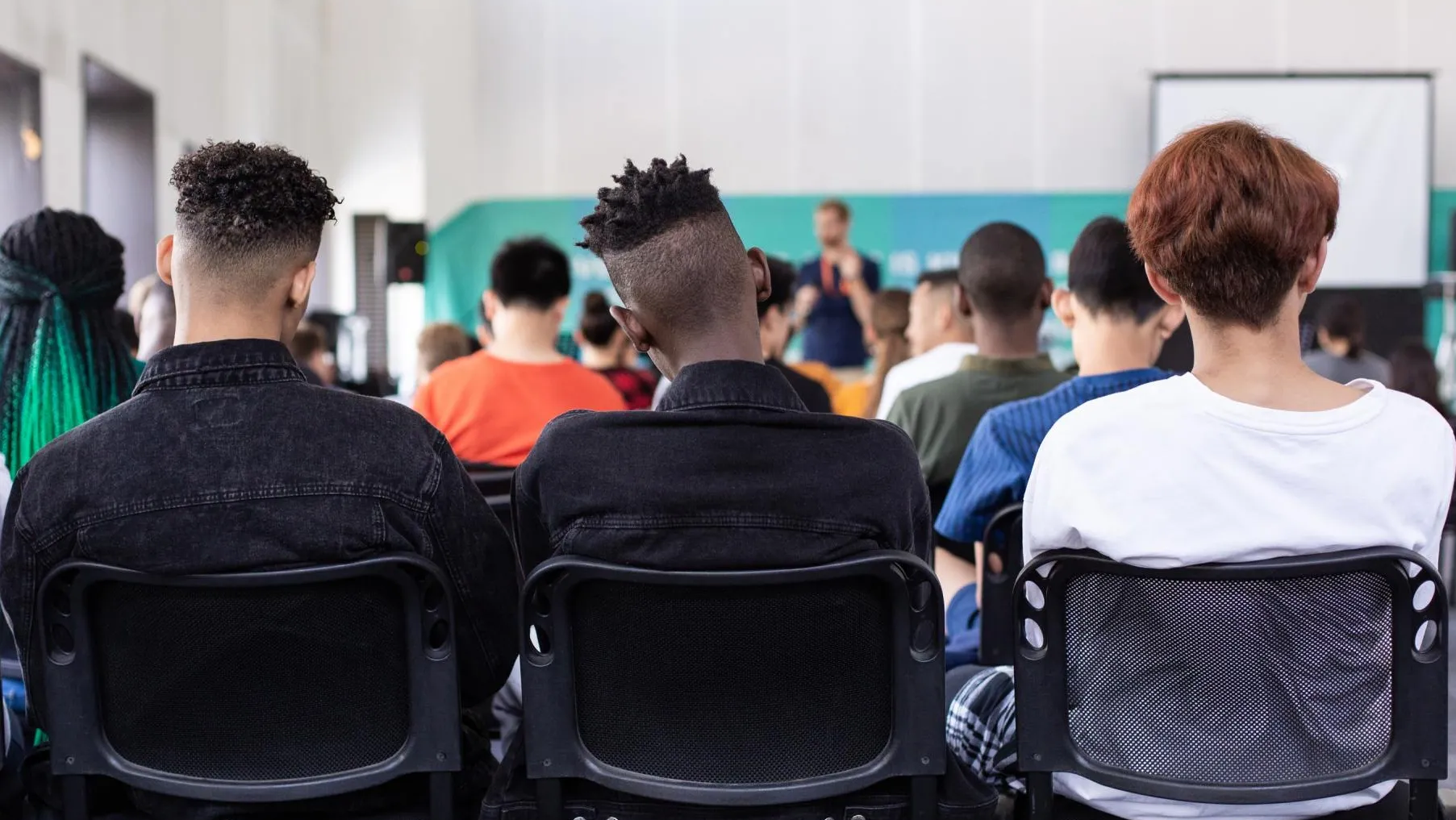
If you found this useful , you may also be interested in our IELTS SPEAKING ESSENTIALS - FREE 5 DAY MINI-COURSE.
Want to get 6.5 or above?
Join our ielts speaking masterclass course.

© ESSENTIAL IELTS 2021 | ALL RIGHTS RESERVED
- IELTS Books
- Speaking Part 1
- Speaking Part 2
- Speaking Part 3
- Multiple charts
- Opinion Essays
- Discussion Essays
- Problem Solution Essays
- Advantages & Disadvantages Essays
- Double Question Essays
- Formal Letter
- Informal/personal Letter
- Semi-formal Letter

IELTS Speaking Part 3: Topic Education
The topic Education often appears in IELTS Speaking Part 3. Here are sample answers to this topic.
1. Do you like the education system of your country? Yes, I feel that education system of my country covers almost all the basis but there is one area where we can improve a lot and that is curriculum.The syllabus is very old and needs an immediate change. Most of the students are learning certain things that are out of date and some are learning the things that are not that practical. 2. What changes do you want to make in the education system of your country? I would like to make a couple of changes to the system. The first one is that I want to make the education more practical rather than cramming hundreds of theory books. The second change will be in the curriculum. It needs to be more diverse and should develop a student holistically. 3. How many hours a student should read books apart from his studies? I think it is unfair to them. They are under a burden of so many books already. But reading is a great habit. If students can take out some time to read about great leaders or personalities, then I think it is a good idea. In my opinion, students should spend around 3 hours a week on reading material apart from the curriculum. 4. Which was your favourite subject in school time? My favourite subject was science. I liked the diversity in subjects and how the subjects such as physics, chemistry and biology were so different from one another yet so same. I used to be so active during my science class as we would learn new things every day.
5. Any subject that you didn’t like? I never liked mathematics. I used to get confused when I saw all the questions and calculations. That was the subject that I never understood completely and never scored well. I got a lot of headaches while solving the problems in math’s. 6. Which type of education is better, distance learning or regular schooling? In my opinion, both types of education have their advantages. If a person is in a job or a business, then distance education is the best solution for them. But if the student has ample time to study then he or she should go for the regular education.
- speaking part 3
Leave a Reply Cancel reply
#1 ielts app, most popular 24h, [2021] download cambridge ielts 16 books pdf+ audio, ielts speaking part 3 topic : future plan.
The official IELTS by IDP app is here! Download it today.
- Bài thi IELTS IELTS Academic IELTS General Training IELTS UKVI IELTS One Skill Retake Tìm hiểu bài thi IELTS Học Thuật là gì? Tìm địa điểm thi IELTS trên giấy Tìm địa điểm thi IELTS trên máy tính Đổi lịch thi hoặc hủy thi IELTS Hình thức thi IELTS Academic Thi IELTS trên giấy Thi IELTS trên máy tính Tìm hiểu bài thi IELTS Tổng Quát là gì? Tìm địa điểm thi IELTS trên giấy Tìm địa điểm thi IELTS trên máy tính Đổi lịch thi hoặc hủy thi IELTS Hình thức thi IELTS General Training Thi IELTS trên giấy Thi IELTS trên máy tính Tìm hiểu bài thi IELTS UKVI là gì? Tìm địa điểm thi IELTS trên giấy Tìm địa điểm thi IELTS trên máy tính Đổi lịch thi hoặc hủy thi IELTS Hình thức thi IELTS UKVI Thi IELTS trên giấy Thi IELTS trên máy tính TỔNG QUAN VỀ IELTS ONE SKILL RETAKE IELTS One Skill Retake là gì? Hướng dẫn đăng ký thi IELTS One Skill Retake TÌM HIỂU THÊM VỀ IELTS ONE SKILL RETAKE Các tổ chức chấp nhận IELTS One Skill Retake Cách sử dụng kết quả IELTS One Skill Retake Câu hỏi thường gặp IELTS One Skill Retake Đăng ký thi IELTS Lịch thi IELTS Lệ phí thi IELTS Chương trình ưu đãi IELTS Tìm địa điểm thi IELTS
English self-assessment tool
Assess your level of English and get access to a personalised preparation plan now.
Get your results
Check your provisional IELTS results online and do more.
- Simplified Chinese

IELTS Speaking chủ đề Education Part 1,2,3: Từ vựng & bài mẫu
Bài viết này sẽ gợi ý những từ vựng cần thiết và cấu trúc ngữ pháp áp dụng hoàn hảo cho chủ đề Education, cùng IDP xem qua nhé!
Chủ đề bài viết
Với những bạn thí sinh còn đang là học sinh, sinh viên thì chủ đề về Education (Giáo dục) sẽ cực kỳ gần gũi và khá thường gặp trong phần thi IELTS Speaking. Việc chuẩn bị trước những chủ đề phổ biến này không chỉ giúp bạn phản xạ nhanh với đề thi, mà còn mở rộng vốn từ và nâng cao cách lập luận trong bài.
Bài viết dưới đây sẽ gợi ý những từ vựng cần thiết và cấu trúc ngữ pháp áp dụng hoàn hảo cho chủ đề Education, cùng IDP IELTS xem qua nhé!
1. Các câu hỏi về chủ đề Education trong IELTS speaking
Nếu bạn bắt gặp chủ để Education trong phần thi IELTS Speaking, bạn sẽ được hỏi về việc học tập hoặc thảo luận về những vấn đề, quan điểm liên quan đến lĩnh vực giáo dục, điển hình như là:
Did you go to a co-educational school?
What was your most favorite subject when you were a kid?
What is special about your major?
Describe your favorite subject at school
What are the advantages of studying a distance learning course?
2. Từ vựng ghi điểm chủ đề Education
Từ vựng về các cấp trường học, từ vựng về các hoạt động giảng dạy, từ vựng khác liên quan đến chủ đề, 3. idioms chủ đề education.
Xem thêm: Từ vựng IELTS chủ đề Education
4. Tổng hợp bài mẫu chủ đề Education
Phần thi ielts speaking part 1.
What do you like about your major?
What I especially like about my major is that it covers a lot of economic knowledge, so I can have a wide range of career options. I can work as a banker or a purchaser at giant companies. That’s not to mention, I can make friends with a lot of brainy people.
Would you prefer to study alone or with others?
I consider myself an easily distracted person, so I prefer to study alone. To be honest, I can’t focus on studying at all when there is a noise around, be it loud or small.
What kind of school did you go to when you were a kid?
I attended a public school for my education from preschool to sixth grade. During my time, it was the best and most well-known primary school.
Phần thi IELTS Speaking Part 2
Describe your favorite subject at school (Mô tả môn học bạn yêu thích ở trường)
Of all the subjects at school, history has always remained my favorite. In every history class, we were introduced to many key historical occurrences. It was a dull topic for some of my classmates, but I really liked it.
I recall at our first meeting, our teacher handed out a syllabus, which served as a roadmap for the key topics we would cover each week. Several novels and other reading materials were given to us as homework. We discussed notable personalities, including soldiers, philosophers, and artists. We also discussed the ancient peoples' religions, traditions, and customs.
Unlike many other subjects, history requires not only a good memory but also the ability to connect all the dots of past events to draw important lessons.
It was a difficult topic for me and my classmates at the time since memorizing so much of it took up so much of our time. But I find history to be quite fascinating. I've always been interested in how people lived in the past. I've always been curious to learn how our generation's past shaped who we are now. It intrigues me.
Phần thi IELTS Speaking Part 3
Is a good education more important to a boy or a girl? Why?
I think it is equally important for both boys and girls to pursue a good education. In today's culture, women have repeatedly demonstrated their ability to handle duties and obtain positions that were previously solely held by men in a variety of sectors, including politics, science, athletics while males have started working in certain fields that were formerly thought to be reserved only for women, like fashion, housework, and cooking. It is obvious that anyone can only live up to their fullest potential if given an opportunity regardless of their sex.
Bài viết trên đã tổng hợp bí kíp giúp bạn hoàn thành phần thi Speaking chủ đề Education bao gồm câu trả lời mẫu và list từ vựng chủ chốt có thể áp dụng cho cả ba phần. Hy vọng rằng bài viết sẽ hữu ích và giúp bạn ôn tập IELTS hiệu quả ngay tại nhà.
Chuẩn bị cho kỳ thi IELTS Speaking cùng IDP!
Với kinh nghiệm dày dặn trong việc giúp thí sinh chuẩn bị cho kỳ thi IELTS, IDP luôn hỗ trợ bạn truy cập miễn phí vào các nguồn tài liệu luyện thi hữu ích bao gồm các bài viết, video chia sẻ bí quyết làm bài từ chuyên gia quốc tế để nâng cao khả năng làm bài.
Bên cạnh đó, bạn có thể đăng ký trải nghiệm thi thử tại các trung tâm khảo thí IELTS của IDP, tham gia Hội thảo sự kiện IELTS do các chuyên gia IDP trực tiếp hướng dẫn để hiểu hơn về những lỗi phổ biến cần tránh, nghiên cứu một số câu hỏi và câu trả lời mẫu cùng video hướng dẫn luyện thi từ chuyên gia.
Đăng ký thi IELTS cùng IDP tại đây!
IELTS Speaking chủ đề Food
IELTS Speaking chủ đề Study
IELTS Speaking chủ đề Hobbies
Về bài viết
Published on May 22, 2023
Quỳnh Khanh
Tôi là Quỳnh Khanh - Content Writer có hơn 5 năm về lĩnh vực giáo dục
Chia sẻ bài viết
Clause là gì? Các loại mệnh đề trong Tiếng Anh
Chuẩn bị cho kỳ thi IELTS với 6 bước đơn giản sau
Thi trên máy tính và thi trên giấy - Hình thức thi nào dễ hơn?
Các cách rút gọn mệnh đề quan hệ trong Tiếng Anh
Mệnh đề quan hệ (Relative Clause): Cách dùng và Bài tập
Liên từ trong Tiếng Anh (Conjunction): Các loại và cách sử dụng
Liên từ phụ thuộc trong Tiếng Anh (Subordinating Conjunctions)
Mệnh đề chỉ mục đích trong Tiếng Anh (Clause of purpose)
Các mệnh đề chỉ kết quả (Adverbial clause of result)
Mệnh đề trạng ngữ chỉ thời gian (Adverbial clause of time)
- Hình thức thi IELTS
- Các tổ chức công nhận IELTS
- Tin tức và bài viết cập nhật
- Sự kiện IELTS
- Hình thức thi nào phù hợp với tôi?
- Chương trình ưu đãi IELTS
- Đối tác IDP IELTS tại Việt Nam
- Câu chuyện thành công
- IELTS - Tấm vé vàng để đi du học
- Liên hệ IDP IELTS
- Thi IELTS trên máy tính
- Thi IELTS trên giấy
- IELTS Học thuật
- IELTS Tổng quát
- IELTS UKVI Học thuật
- IELTS UKVI Tổng quát
- IELTS UKVI Life Skills
- IELTS One Skill Retake
- Đăng ký thi IELTS
- Lịch thi IELTS
- Lệ phí thi IELTS
- Tìm địa điểm thi IELTS
- Câu hỏi thường gặp về IELTS
- Bài kiểm tra IELTS Familiarisation
- Ứng dụng IELTS by IDP
- IELTS Masterclass
- Tải các mẫu đơn
- Cam-pu-chia
- Cộng hòa Síp
- Netherlands
- New Caledonia
- New Zealand
- Papua New Guinea
- Philippines
- Ả Rập Xê Út
- Quần đảo Solomon
- Tây Ban Nha
- Quần đảo Ellice
- Các Tiểu Vương quốc Ả Rập Thống nhất
- Liên hệ với chúng tôi
- Thông báo pháp lý
- Chính sách quyền riêng tư
- Chính sách cookie
- Bản quyền 2024 IDP IELTS

What Are Effective Speaking Skills?
American writer Dale Carnegie famously said, “There are always three speeches, for every one you actually gave. The one you…

American writer Dale Carnegie famously said, “There are always three speeches, for every one you actually gave. The one you practiced, the one you gave, and the one you wish you gave.” His words are a testament to the importance of speaking skills when it comes to communication.
Effective speaking has the power to change history, whether it is to turn the tide of war or announce the independence of a nation. In the modern context, speaking skills have been effective in launching iconic products. They’ve even brought back companies from the edge of bankruptcy.
The right combination of words and gestures can inspire people, spur them into action, and get them to dedicate themselves to a cause.
What Are Speaking Skills?
The importance of speaking skills, types of speaking skills and frameworks.
People believe that effective speaking is a natural talent. Either you have it or you don’t. But this is not true. You can learn different types of speaking skills and become good at it.
You can’t take speaking skills lightly, no matter how talented you are. If you speak with conviction and passion, it will help the audience relate to you, believe in you, and remember you.
The question then is: what are speaking skills? They are techniques that enable a speaker to convey a message effectively.
Speaking skills don’t just involve the use of the right words. Your body language also has a major role in conveying a message.
There are three main aspects of effective speaking:
Language is an integral part of speaking skills. The words you use must suit the occasion and the audience. For example, the language you use when speaking to a friend is different from the one you use for a formal presentation.
Effective speakers customize their message to suit their audience. The audience is familiar with certain types of words. It’s important to use such words to get them to respond. For example, using industry terms in a client meeting can evoke desired responses.
As a general rule, shorter and simpler sentences work well. They are easier to process and understand, and they create a sense of urgency. For example, in the Avengers series of movies, when Captain America says, “Avengers assemble!”, and not “Avengers, gather around me”, the message becomes memorable and impactful.
Similarly, the memorable line in Jawaharlal Nehru’s Independence Day speech in August 1947, “At the stroke of the midnight hour”, conveyed the gravity of the occasion, which a line like “At 12.00 am…” may not have.
Another aspect of speaking skills in communication that is often ignored is your voice. It includes pitch, tone, and strength. How you speak signals your emotional state.
A low voice and too many pauses could denote hesitation. Clarity and volume could denote confidence. A strong and confident tone portrays conviction. People believe what you say when you deliver it in a strong voice.
Public speaking requires practice. You might be quite comfortable talking to small groups or in informal settings. But that is not the same as addressing a large crowd, which is why practice and rehearsals matter.
You can slowly read your message aloud, making sure you pause at the appropriate places. This will help you polish your speaking style. Good orators have a tone and style which they own. It’s his distinctive voice that makes Morgan Freeman a favorite Hollywood narrator.
The final aspect of speaking skills is not about speaking at all. Non-verbal communication consists of body language. It includes facial expression, posture, eye contact, and hand gestures. Your body language must match your words for your address to be effective.
Your body language signals to the audience how invested you are into what you are speaking about. It shows the passion behind your words and helps draw the audience emotionally to your message and make them feel involved.
You might think that you’re never going to lead an army or coach a cricket team. So why would you need to practice speaking skills? The fact is, such skills will come in handy not only at your workplace but also in your personal life. Here’s how:
Getting them to say ‘yes’
One of the objectives of speaking effectively is the ability to persuade: when you need your manager to back your idea, when you want your team to work longer hours or when your spouse needs convincing to watch your favorite movie. These are all instances that require effective speaking.
The whole point of speaking skills is to be able to sway people’s opinions. It’s to get them to act in alignment with your goals.
Developing a career edge
Being an effective speaker separates you from the corporate herd and pitches you as a valuable resource for your company. It, of course, gives you an edge over your colleagues.
Effective communicators get special treatment because they are often asked to represent the company. They’re the ones meeting the important clients, negotiating and closing deals, and building a reputation for the company.
For example, when you need to impress a new client, you send your best salesperson. You won’t send in someone new or inexperienced. The best salesperson is almost always your best speaker.
When it’s time for promotions and bonuses, speakers are rewarded first. Companies invest significantly in their training. They’re the ones who get groomed for leadership posts.
Holistic communications development
Speaking skills hold a special place of value. Good speakers are also good writers for they would have written several drafts of each speech.
Good speakers are also those who can connect and empathize with people. This makes them approachable and authentic. Often, people gravitate towards them for support and advice. ( punandjokes.com )
They are also readers, as reading helps expand the vocabulary and develop the flair for using suitable words for different situations.
Thus, practicing speaking skills leads to the development of writing, listening, and reading skills too.
Becoming an expert
Effective speaking signals subject matter expertise because of the research that the making of a good speech would involve. That is why a good speaker is also regarded as a leader and influencer.
Popular intellectuals such as Barack Obama and Richard Dawkins are all good speakers. When they talk, we believe them. We trust them to know what they’re talking about. To rise to a position of fame and influence, having effective speaking skills is a must.
Feel like a boss
Establishing a genuine connection with the audience gives a sense of accomplishment. Listening to the audience’s applause is a great boost for self-esteem . Being appreciated by the audience is like receiving a gift for all the hard work that a speaker puts in.
While speaking effectively is rewarding, it is also challenging. Various speaking skills and frameworks can help overcome the challenges.
1. Aristotle’s Appeals
One of the most useful frameworks speakers use is Aristotle’s Appeals. They help you find various ways to appeal to the audience. Your appeal can be based on logic, authority, and emotion.
The audience might listen to you because your argument makes sense. They might listen because you’ve appealed to their anger or sadness or some other emotion. They could also listen to you because you’re an expert.
These different types of appeals are also known as Logos, Ethos, and Pathos .
2. The PAM Framework
Another useful framework is PAM (Purpose, Audience, and Message). You convey the purpose or objective of your speech to the audience through a verbal message.
The PAM framework requires you to know your audience, their triggers, likes, and dislikes.
3. The Three Ws
You can also use an introspective framework. This is where The Three Ws of speaking will come to your aid.
The first ‘W’ is ‘Why are you delivering this speech?’ The second is ‘Who is listening?’ And the third ‘What are you talking about?’ Together these questions help you define your purpose and your audience. The third question helps you structure your speech.
The importance of speaking effectively lies in its tremendous potential to induce change. A good speech can inspire employees and even save companies.
Their words may fade over time, but the feeling they leave us with never diminishes. In the words of American poet Maya Angelou, “I’ve learned that people will forget what you said, people will forget what you did, but people will never forget how you made them feel.”
To learn more, sign up for Harappa Education’s Speaking Effectively course. It covers all these concepts and a few more including the Harappa Idea Funnel and the Elevator Pitch . Join now to learn how to become an effective speaker.
Explore our Harappa Diaries section to know more about topics related to the Communicate habit such as the importance of reading , report writing , and interpersonal skills .

- Share full article
Advertisement
Supported by
The Education Issue
My Family’s Experiment in Extreme Schooling
An education, three american siblings attend an experimental school in moscow where instruction is only in russian and classes are videotaped to improve teaching..
Danya: It was definitely very very hard when I was first plopped into a Russian school. I was old enough that I kind of prepared myself for it. It was like “Ok, you’re not going to know what is going on... just sit there and do nothing. It doesn’t matter.” And, that’s pretty much what I did. If I didn’t know what was going on, I just sat there and did nothing. Arden: The only things that I knew about Russia was that it had a lot of snow, they speak a different language and they have Matryoshka dolls. That’s literally all I knew. Emmett: [In Russian] It was very difficult to speak Russian. But, now I speak fluently. It is easy for me to speak. TITLE: AN EDUCATION: FOUR YEARS IN A PROGRESSIVE RUSSIAN SCHOOL Bogin: Comrades! Are you ready to start the day? Arden: We moved to Moscow because of my dad’s work. He’s a journalist for The New York Times. Cliff: Say hello on the first day of school Kids: Hello. Arden: My family decided that we would all the kids go to Russian schools because we really wanted to live in the culture and get to know it. Danya: So, I didn’t know that much about Soviet schools. All I knew was that all the kids had to sit there very straight and they had to put one arm up when they want to raise their hand and it’s all very strict and the teachers were not nice and they would yell at the kids and call them stupid. I did know that I didn’t want to go to a school like that. Bogin: Soviet school was the school where there were only two opinions. The opinion of teacher which was the right one and all the others which were wrong. My vision was this school to be quite different. And the children must be taught to think. SLATE: IN 2007, THE LEVY CHILDREN WERE THE FIRST NON-RUSSIAN SPEAKING STUDENTS TO ATTEND THE SCHOOL. Bogin: They were put in a very very difficult situation because they were not prepared for learning in Russian. The methods are different. Everything is different and I had a lot of doubts. Arden: It was hard especially in the first year, there were times when I was like “Omigod get me out of here.” Julie: She’s not happy. Cliff: It’s alright. She’ll be fine. Arden: I was actually excited about learning Russian before I learned how it’s actually very hard to learn a different language. // I learned not to beat myself up for not being as good as the other kids because there was really nothing I could do about it. I just didn’t speak Russian and they did. Danya: Russian is a very hard language. People think that for kids it’s so easy to learn a language which is true to a certain extent. But I was 9, when I started learning the language and it was really hard. // After 4 months when I didn’t really speak the language... It was very frustrating because if you wanted to say something and you can’t it’s very annoying. // My brother Emmett who was 4,5 had a very different experience than I did because I don’t think he even noticed he was somewhere else besides the fact that people were speaking in a strange language he didn’t understand. Emmett: Sometimes I actually didn’t understand what I had to do. // I feel like don’t know this. I can’t do this. What is this for? Sometimes I’d just get frustrated. Danya: My parents were worried that it’d be too stressful for us. Arden: We came here from going to PS 321 a Brooklyn public elementary school. At PS 321, it was like, everyone’s a winner. The most important thing is to have fun, everybody plays, there’s no like first, second or third place. Here it’s like a different planet. Bogin: Out of 18 points. Here’s what you got. Danya: Here they send an entirely different message to the kids. They’re like “learning is hard. But, you have to do it. You have to get good grades, that’s just what you have to do.” Arden: In the hallway, they hang up the rating for the entire school to see and there’s like different groups. There’s the best, then the middle then the worst and then the “omigod, you’re really bad.”

By Clifford J. Levy
- Sept. 15, 2011
The phone rang, and my stomach clenched when I heard her voice. “Daddy? I want to go home,” said my 8-year-old daughter, Arden. Two hours earlier, I dropped Arden and her two siblings off at their new school in a squat building in a forest of Soviet-era apartment blocks on Krasnoarmeyskaya (Red Army) Street in Moscow. They hugged me goodbye, clinging a little too long, and as I rode the metro to my office, I said a kind of silent prayer to myself that they would get through the day without falling apart.
But Arden had just spent the minutes between class periods hiding in the bathroom so no one would see her crying. Finally, she composed herself, found her teacher and pantomimed that she needed to talk to me. “I don’t understand . . . anything,” she told me. I tried to respond with soothing words, but I had no idea what to do. You can tell your kid to tough it out when she transfers from one school to another in your hometown. This was different.
My three children once were among the coddled offspring of Park Slope, Brooklyn. But when I became a foreign correspondent for The New York Times, my wife and I decided that we wanted to immerse them in life abroad. No international schools where the instruction is in English. Ours would go to a local one, with real Russians. When we told friends in Brooklyn of our plans, they tended to say things like, Wow, you’re so brave. But we knew what they were really thinking: What are you, crazy? It was bad enough that we were abandoning beloved Park Slope, with its brownstones and organic coffee bars, for a country still often seen in the American imagination as callous and forbidding. To throw our kids into a Russian school — that seemed like child abuse.
Most foreign correspondents, like expatriates in general, place their children in international schools. Yet it seemed to us like an inspiring idea. After all, children supposedly pick up language quickly. So what if mine did not speak a word of Russian and could not find Russia on a map. They were clever and resilient. They would adapt, become fluent and penetrate Russia — land of Dostoyevsky and Tchaikovsky, the Bolshoi Ballet and the Hermitage Museum — in ways all but impossible for foreigners.
But the fantasy of creating bilingual prodigies immediately collided with reality. My children — Danya (fifth grade), Arden (third grade) and Emmett (kindergarten) — were among the first foreigners to attend Novaya Gumanitarnaya Shkola, the New Humanitarian School. All instruction was in Russian. No translators, no hand-holding. And so on that morning, as on so many days that autumn of 2007, I feared that I was subjecting them to a cross-cultural experiment that would scar them forever.
I told Arden that I would call her back, and then I called my wife, Julie Dressner. “What should we do?” I asked. We had decided together on a Russian school, but it would become a source of tension between us. Our children were miserable, which caused us to doubt moving abroad — and to sometimes turn on each other. I wanted to give the school more time and not demand more from the teachers. Julie was alarmed and thought that we had to do something. But Julie was frustrated by our options, short of pulling them out. At one point, after a lengthy discussion with several of the teachers, she walked out of the school nearly in tears. She was studying Russian, but she realized that she had missed much of what had been said. How can you help your children when you can barely communicate with their teachers?
Julie and I talked. I wondered whether it might be better if I went to the school and persuaded Arden to stay until the end of the day, if only in a quiet room, reading a book in English. Julie wanted her picked up, reasoning that it would be smarter to start fresh tomorrow. I didn’t want to argue about it. When I found her at school, she brightened. It was as if she were being rescued. I held her hand as we walked to the metro, and I told her that I recognized that what she was doing was hard. I gently added that it would be nice if this were the last time that she left school early because she was upset. I suspected that it wouldn’t be.
When we started searching for schools, we assumed that a large public one in Moscow would be too daunting. Julie stumbled upon the Web site of New Humanitarian, a private school with 150 or so pupils and small classes. It promised an enlightened and innovative interpretation of the classic Soviet education — all the rigor, without the suffocating conformity. Moscow progressives! Maybe the transition wouldn’t be too rocky.
We were, of course, naïve. New Humanitarian, which runs kindergarten through high school, was still rooted in Russia’s educational and societal traditions. Students recite by heart from Pushkin’s “Yevgeny Onegin” (“My uncle was a man of virtue. . . .”) and tackle algebra as early as fourth grade. Children older than 9 are regularly rated, based on test scores. Student rankings are posted on a central wall for all to gawk at, like the latest sports stats.
In those first months, our kids found themselves bewildered and isolated. Danya was a typical oldest child, a coper who rarely lost control. At night, though, she had insomnia. In class, she braced herself for that moment when she was asked for homework. She sometimes did not know whether it had been assigned. During Russian grammar, the words on the blackboard looked like hieroglyphics. She tried to soothe herself by repeating a mantra: “It’s O.K. to feel like an idiot. This is going to take time.” But she felt betrayed. We had assured her that children grasp language effortlessly, and there she was, the dumb foreigner.
Arden was resisting getting out of bed in the morning, hugging her blanket in her room, where we had painted the walls to resemble green hills and blue skies. At recess, while others played vyshibaly , a Russian version of dodgeball, she passed the time walking back and forth on the curb, all alone, as if on a balance beam. Back at P.S. 321 in Park Slope, she relished her relationships with teachers, sometimes preferring to hang out with them instead of going to recess. At New Humanitarian, she could barely talk to them.

We hoped that Emmett would fare better, because he was only 5½ when he started. But one morning, he did so poorly on a minor exercise, involving drawing lines on graph paper, that he refused to hand it in. “Please let me see it,” his teacher implored. “Everyone is just learning here.” Finally, he crumpled the paper and smothered his face in it.
One night, he complained that he was not getting called on in class and knew why.
“Why?” I asked.
“Because I’m an American,” he said.
I tried not to laugh. Though I could have used a good laugh.
I convinced myself that what they were doing was no different from what millions of immigrants in the United States do all the time. Yet my unease stemmed from more than the school. When we arrived in Russia, the country was still suffering through the aftermath of the humiliating Soviet collapse in 1991. Vladimir Putin, a former K.G.B. agent who scorned Western-style democracy, was ruling undisputed. Many Russians — fed up with post-Soviet disorder — applauded him.
With oil prices soaring, the economy, based on natural resources, was riding high. In Moscow, newly prosperous Russians embraced a breathtaking materialism, making up for Soviet deprivation. They sped down Tverskaya Street in Lexus S.U.V.’s, outfitted their homes with Poggenpohl kitchens and piled into Cantinetta Antinori and other restaurants run by celebrity chefs from Europe. Moscow has 10 million people, and most are not wealthy. But after a few months, I remember thinking, Was this a society that I wanted to embed my kids in?
We first visited New Humanitarian when Danya, Arden and Emmett were being evaluated for admission. We were met by a man with a shock of steel-wool hair and teeth whose color and arrangement suggested decades of Soviet dentistry and heavy smoking. His name was Vasiliy Georgievich Bogin, and he was the school’s founder and maestro.
We had just left Brooklyn and were spending our first year in Russia in St. Petersburg, the country’s second-biggest city, where I was studying intensive Russian before starting my job in Moscow. The kids were at a private school in St. Petersburg that had a program for foreigners who wanted to learn Russian. Their language skills were rudimentary.
At the school in Moscow, Bogin spent 45 minutes with each of the three, speaking to them in English. He gave Danya an algebra problem that was clearly too hard for her. He constructed the outline of a fish with toothpicks and asked Arden to make the fish face in the opposite direction by moving only a few pieces. He had Emmett take apart and rebuild a house made of blocks. He seemed to care about the way they thought, not what they knew. The children found him bizarre. But Bogin was giving us a taste of his methods.
Bogin, who is in his 50s, would be nearly six feet tall if he had better posture, but he always seems to lean forward, drawn to something else as he prowls the school. His eyes have the impish gleam of a man cooking up a brainteaser for the next person he encounters. (“Anyone who thinks that 2 + 2 = 4 is an idiot,” he likes to say. But more on that later.)
When Bogin was growing up in the Soviet era, the party used schools to mold loyal Communists. Teachers wove propaganda through the lessons and enforced memorization like drill sergeants. Bogin detested it. “I didn’t want to be a slave,” he told me. “I didn’t want to be a person who is ordered and must obey the orders without any thinking. I didn’t consider myself to be a person who repeats texts without any criticism or thinking or any alternatives.”
Just as political dissidents fought the Soviet regime, so, too, did others oppose the educational system. Bogin was one of them. After studying English in college and serving in the army, he decided to become the kind of teacher he craved as a child. At a school in the Moscow suburbs in the late 1980s, he challenged pupils to challenge him — and everyone else. It was the height of perestroika under the last Soviet leader, Mikhail Gorbachev.
Soon after Communism’s fall, Bogin opened New Humanitarian, one of the first private schools in Russia, in a cramped building that had been a nursery school for children of workers at a military factory. New Humanitarian remains there, and Bogin’s inability to renovate the building or find a bigger one reflects to some extent the establishment’s ambivalence toward his brilliance as an educational provocateur. (While the school is private, it is still heavily regulated by the government.)
After Bogin met my children that day in 2006, he told us that he very rarely admitted nonnative Russian speakers, let alone Americans, and he made clear that he could not provide separate classes for my children. We thought that he was preparing us for rejection. Then he said, “But I will take them.”
As the kids struggled during those first months, we promised them that they could switch to an international school at any time. Yet even as we fretted, they were developing survival skills on their own. They asked teachers for extra help after class. To prove to classmates that they were not clueless, they tried to do well in subjects that did not require a lot of Russian, like math. The girls employed a tactic that they called the smile-and-nod when they didn’t understand what someone was saying. They remembered the words and furtively looked them up.
All three were starting to converse in Russian, albeit with accents and grammatical errors, as if the language were seeping into their consciousness. “It was kind of like solving a code, because every day, you just have to figure out something new to say and some new way you have to act,” Danya later told me.
Even Russian-literature class seemed less daunting. Arden’s teacher was discussing Russian fairy tales one morning when she realized that Arden did not know the classic ending to many. It was akin to “. . . and they lived happily ever after.”
She asked Arden to repeat each word. Arden did. She told Arden to recite the sentences by herself. Arden hesitated, as if she were going to refuse, as she had many times before.
But then she did it. Her classmates applauded, and she beamed.
At the beginning of the year, the other children treated Danya, Arden and Emmett as curiosities. They occasionally mocked the three for their mangled syntax, though the school cracked down on that. Bogin even devised a ploy for Emmett’s class: one of the school’s English teachers conducted a lesson entirely in English. “This is what every day is like for Emmett,” the teacher explained. One boy was so tormented trying to follow along that he burst into tears.
The teasing eventually stopped, and some children started looking out for mine, assisting them with homework and inviting them to birthday parties.
Bogin had been concerned that our kids would not make it. But he saw that they were progressing and that they were an example for the rest of the school. By that point, we were enthralled by Bogin — he was a character out of our romanticized notion of the Russian intelligentsia. He could take humdrum topics — say, how children raise their hands in class — and turn them into lengthy dialogues that were never boring. Julie and I once had a meeting with Bogin to discuss Emmett’s study habits. It went nearly three hours. Bogin began to believe in our kids and became invested in their success. We drew strength from that.
Late in the spring of 2008, Danya came home with a startling announcement: Bogin had chosen her for the academic Olympiad team, largely for her math prowess. We could not fathom it. How could she understand the questions? She assured us that she was getting it. For the first time, a feeling of optimism washed over us.
Julie and I all but panicked early on, in large part because we felt powerless. Our inclination as parents had been to intervene to protect our children. But maybe it was better that they had to win these battles by themselves. As Bogin often says, “Life is the best teacher.”
As things settled, we were discovering that New Humanitarian was a pretty remarkable place. Bogin set up a system of what he called curators, two or three teachers whose job was to oversee the 10 to 15 children in each grade. Curators generally do not conduct lessons but observe classes, identify problems and take children to meals and activities. Everyone ate breakfast, lunch and snacks in the cafeteria, where comfort food, from borscht to blinis to cinnamon rolls, was served by doting cooks. My kids gobbled it up, and Emmett stopped wielding a fork and knife like a caveman. Many children, including ours, stayed at school until 6 p.m., doing homework with curators. This was a godsend for us, because we had difficulty helping with assignments.
New Humanitarian had standard subjects, like history and math, and Danya had many hours of homework a week. But Bogin added courses like antimanipulation, which was intended to give children tools to decipher commercial or political messages. He taught a required class called myshleniye , which means “thinking,” as in critical thinking. It was based in part on the work of a dissident Soviet educational philosopher named Georgy Shchedrovitsky, who argued that there were three ways of thinking: abstract, verbal and representational. To comprehend the meaning of something, you had to use all three.
When I asked Bogin to explain Shchedrovitsky, he asked a question. “Does 2 + 2 = 4? No! Because two cats plus two sausages is what? Two cats. Two drops of water plus two drops of water? One drop of water.”
From there, the theories became more complex. In practice, though, the philosophy meant that Bogin delighted in barraging children with word problems and puzzles to force them to think broadly. It was the opposite of the rote memorization of the Soviet system.
At dinnertime, the kids taunted me with riddles. “Ten crows are sitting on a fence,” Arden announced. “A cat pounces and eats one crow. How many are left?” “Umm, nine,” I said, fearing a trap. “No, none!” she gleefully responded. “Do you really think that after one crow is eaten, the others are going to stick around?”
Bogin had another innovation: classes were videotaped. This was not a vestige of Soviet surveillance. Rather, he wanted to critique how teachers interacted with — and nurtured relations between — children. Bogin and his staff often worked late into the night, reviewing footage and discussing methodology.
Life at New Humanitarian was full of academic Olympiads, poetry-reciting contests and quiz bowls. The school stressed oral exams, even in math, where children had to solve an equation at the blackboard and explain methodology. Children were graded and ranked, with results posted. We were not accustomed to this: in Brooklyn, the school instilled an everyone’s-a-winner ethos. At New Humanitarian, Danya says, “they send an entirely different message to the kids: ‘Learning is hard, but you have to do it. You have to get good grades.’ ”
At first, when rankings were posted, the school left off Danya and Arden to avoid embarrassing them. (Emmett was too young to be ranked.) As the girls became more comfortable in Russian, their names began appearing. As the months went by, I noticed that they were creeping up the list.
New Humanitarian cost about $10,000 a child our first year. We could afford it — like many companies that send workers abroad, The Times paid tuition. Yet for Muscovites, the school was a strange breed. It was too expensive for most but not appealing to the rich, who often preferred compliant teachers and lavish facilities. With its warped floors and narrow hallways, New Humanitarian looked like an old annex to a public school in Queens.
The school attracted upper-middle-class parents who were impressed with Bogin. In my children’s grades, the parents were lawyers, professors, bankers, architects, publishers, restaurateurs and a cosmetics manufacturer. They drove nice cars, lived in apartments that had been privatized in the post-Soviet era and vacationed in Western Europe.
I looked upon them as Russian versions of the parents who populate the Upper West Side, TriBeCa or Park Slope. Moscow has some strong public schools, but the system as a whole is dispiriting, in part because it is being corroded by the corruption that is a post-Soviet scourge. Parents often pay bribes to get their children admitted at better public schools. There are additional payoffs for good grades.
The parents at New Humanitarian exhibited one stark difference from their counterparts in New York: they were apolitical and often fatalistic about their nation’s future. Like many Russians in the Putin era, they turned inward, shunning public life and focusing on the personal. To do otherwise was risky. You can criticize the government in private as much as you want — K.G.B. snoops no longer lurk. But anything more than that and you might be fired or lose a contract or get a visit from the police. That anxiety is always there.
Aleksei Skvortsov, a retail executive who was the father of a boy in Emmett’s class, reminded me of the devoted dads I used to see taking their children to P.S. 321. When I asked Skvortsov what had happened to his generation, he responded: “I think that most people in Russia do not in any way believe that they can influence changes in society. So they concentrate on those changes that affect their personal lives.”
Still, the parents’ choice of New Humanitarian was in some sense an act of rebellion. They realized that after Bogin was done with their children, they would not succumb to anyone’s demagoguery.
Bogin disliked the Russian leadership, especially Putin, who seemed too Soviet to him. But Bogin was not active in politics, knowing that to support the opposition was to court unfavorable attention from the authorities. I was curious, though, how the government perceived him. He had devised a compelling model that could help rescue the education system. But he was ignored.
Last spring, I went to see Valery Fadeyev, a prominent journalist who is a member of the Public Chamber, a Kremlin advisory council, and has close ties to the liberal wing of Putin’s ruling party. Fadeyev’s daughter attends New Humanitarian, and he was thrilled with the school. He told me that the Kremlin’s educational bureaucracy was aware of Bogin but too calcified to care.
“The authorities do not prevent him from working, but they don’t have any use for him either,” Fadeyev said. “They don’t understand that education reform is the only real source for the revitalization of our country.”
Somehow, as the second year was melting into the third and fourth, life at New Humanitarian became normal. Danya was going to the coffee shop with her friends Masha and Dasha. Arden was excelling at Russian grammar, perhaps because she learned the rules from scratch, unlike native speakers. Both girls were at the top of the academic rankings. Emmett, still too young to be rated, was also thriving.
When I dropped them off in the morning, I was amazed as they bantered with other children. They no longer translated from English to Russian in their heads — the right words tumbled out. On the streets of Moscow, they were mistaken for natives. (Foreign residents have long resented how Russian theaters and museums charge foreigners a steep premium. We took great pleasure in sending the kids in to buy our tickets at the cheaper price.)
Their fluency and familiarity with the culture unlocked doors everywhere. On a long train ride to Estonia, they befriended a middle-aged construction executive and his wife, a doctor, who were from southern Russia. The couple set out black bread, pickled vegetables and smoked fish for the kids, and everyone sat there snacking and chatting for hours.
Arden joined a troupe that did not only ballet but also modern dance. At school, Danya was assigned Tolstoy and Chekhov, and then on her own, she started reading Mikhail Bulgakov’s “The Master and Margarita,” one of the most famous Russian novels of the 20th century, in the original.
The kids’ sense of belonging raised an awkward issue: Were they becoming more Russian than American? Were they assimilating, like immigrants everywhere? Julie and I had grown to love Russia and its people, but aspects of the country — its drift toward authoritarianism, its conservative social mores — still troubled us.
The children, as always, figured it out before we did. They integrated their American identities into the school, rather than spurning them. They helped the English teachers. They described life in the United States to friends. I knew that we had nothing to worry about when one of Arden’s curators, Galina Lebedeva, recounted how Arden demanded that girls move tables during cleanup, just like boys. “Arden, our American feministka, said the girls were as capable of doing the lifting as the boys,” Lebedeva told me with a smile. “We said, ‘Fine.’ ”
And then, after five years in Russia, it was time to return to Brooklyn.
Danya, now nearly 14, was ambivalent about leaving, drawn toward being a teenager in New York City. But Arden and Emmett would have gladly stayed. “I feel like I’m tugged in two ways, and I have no idea what to do,” Arden told me last spring. “That’s the one problem with living abroad. You end up getting those weird feelings like, Oh, I can’t leave; I can’t stay.”
On the kids’ final day, Bogin called an assembly to wish them goodbye. He started praising them for all they had overcome but then stopped. This, too, would not be just a lecture.
“What would we not have had if these three had not been here?” he asked. “How did they enrich our school?”
“Theater!” someone shouted back.
“The school newspaper!”
“Great friendships!”
A chant began. “ Spa-si-bo! Spa-si-bo! ” (“Thank you!”)
Some teachers and children had tears in their eyes.
I went onstage to express my deep appreciation but was too choked up to speak. Suddenly, Arden strode forward and took the microphone. In confident and flawless Russian, she thanked the school for all of us.
Clifford J. Levy ([email protected]) is a deputy metro editor of the Times. He won a Pulitzer Prize for international reporting for his coverage of Russia in 2011.
Editor: Aaron Retica ([email protected])

NewsMatch Challenge: Support investigative reporting from LPM, and your gift is doubled.
Community outraged at Jefferson County Board of Education member’s letter to principals

In an open letter, Jefferson County Board of Education member Chris Kolb admonished principals for speaking out about their transportation concerns, saying it made Jefferson County Public Schools Superintendent Marty Pollio look bad.
Jefferson County Public Schools employees and community members say they were alarmed Wednesday when a school board member wrote an open letter reprimanding school and district leaders for voicing their concerns about transportation proposals.
The letter, written by District 2 Jefferson County Board of Education member Chris Kolb, accused principals of “contributing to a damaging narrative about JCPS,” and warned that their actions “reflect very, very poorly” on JCPS Superintendent Marty Pollio.
The letter came a day after a heated board meeting , during which dozens of school principals spoke out against a new start times overhaul.
“If I was Dr. Pollio, I would be apoplectic with several of you whom Dr. Pollio has himself hired, promoted, or kept on through the years,” Kolb wrote.
LPM News has obtained documentation showing Pollio personally directed his assistant superintendents to send Kolb’s letter to all principals, a decision that astounded Louisville Branch NAACP president Raoul Cunningham.
“To me, it’s a threat,” Cunningham told LPM. “A threat not only to your employment but to your ability to move upward.”
Cunningham said he believed the letter violates ethical conduct both on the part of Kolb and Pollio.
In a statement, JCPS spokesperson Carolyn Callahan said Kolb “asked Dr. Pollio to distribute the email to all JCPS principals.”
“This is a reminder that the board members are my seven bosses and employers,” Pollio wrote in an email to LPM.
Pollio also shared an email chain in which Kolb asked Pollio to send out his letter, and another email two hours later in which Kolb followed up to say, “[A]ctually you don’t have to send it out. It probably puts you in a bad spot.”
Emails show Pollio had already sent out the letter by the time he got Kolb’s second email.
The letter is a response to concerns school leaders expressed during Tuesday night’s board of education meeting. Elementary school principals made a rare show of unified opposition to the start times proposal. Meanwhile several middle and high school principals also spoke out against an unofficial proposal to move their students to a later bell time.
The letter also comes about a month after an independent transportation audit found a culture of fear and retaliation in JCPS . Cunningham said Kolb’s letter highlights those findings and shows a “culture basically of suppression of openness … the suppression of disagreement with leadership by employees. I think also not valuing the opinions of employees.”
It is unclear from Kolb's letter which employees he is rebuking. Two elementary school principals who spoke with LPM said they interpreted the letter as an admonishment of the middle and high school principals who spoke out during the meeting.
In the letter, Kolb appears to support a view similar to that of the elementary school group, who cited research showing earlier start times are better for younger students, while older students benefit from later start times. Middle and high school principals, however, told the board Tuesday that later start times present challenges for them, including parking, traffic and interference with after-school activities.
“I am concerned that many of you are simply dismissing the science behind later start times for teens because it is an inconvenient truth,” Kolb wrote in his letter to “JCPS school and district leaders.”
“I did not perceive it as threatening to elementary school principals,” Hite Elementary Principal Sheridan Barnett told LPM, adding that she saw Kolb’s email as being in support of her group’s position that elementary students should have earlier start times.
Another elementary school principal, speaking on condition of anonymity, had a similar view.
Kolb declined to comment further on the letter or clarify which principal group he was writing to.
“I’ve said all I have to say for now,” he texted LPM.
In April, the Louisville NAACP called for Pollio’s removal, along with Kolb’s and three other board members, over their handling of the transportation crisis. Cunningham said Kolb’s letter “intensifies” his belief that both Kolb and Pollio should be removed.
The letter was the last straw for former JCPS principal Michelle Pennix, who is also a leader within the Coalition of Retired Black Principals.
Pennix said she didn’t initially support the NAACP’s calls for a change in leadership. Now she does.
“I think [Pollio] needs to be fired, and I think that Kolb needs to resign,” Pennix said.
Pennix said the letter shows “that Kolb works for the superintendent, and not for the families in our community … that his concern is that Pollio receives an excellent evaluation and that principals speaking up and speaking to their stakeholders is a problem and not one that is received well by him in particular.”
Pennix said during her tenure, principals were discouraged from publicly challenging central office leadership, or even contacting board members.
Kolb is up for reelection in November. District 4 member Joe Marshall and District 7 member Sarah Cole McIntosh’s seats are up for reelection as well, but both Marshall and McIntosh told the Courier Journal they don’t plan to run . The District 1 seat held by Gail Logan Strange will be on the ballot as well.
Below is a copy of Kolb's letter.

Can we count on your support?
Louisville Public Media depends on donations from members – generous people like you – for the majority of our funding. You can help make the next story possible with a donation of $10 or $20. We'll put your gift to work providing news and music for our diverse community.
UGA undergraduate ceremony set for Friday in Sanford Stadium
The University of Georgia will host Spring graduation ceremonies on Thursday and Friday with a total of 8,318 students receiving degrees.
UGA Today, an online media outlet for the university, reported that the ceremony for 6,627 undergraduates will begin at 7:30 p.m. Friday in Sanford Stadium.
The graduate ceremony for masters and specialist degrees, begins at 10 a.m. Thursday in Stegeman Coliseum. The doctoral ceremony is at 2 p.m.
Parking is free, but a clear bag policy is in effect for those entering the stadium.
Graduation ceremonies at many colleges and universities across the U.S. have had their venues changed due to pro-Palestinian protests. A pro-Palestine event is planned in Athens on Friday at the Arch in downtown Athens, where others have been staged in recent days.
The UGA ceremony has not changed from its original announcement.
"The University of Georgia’s Commencement ceremonies will be held as scheduled,” UGA spokesman Greg Trevor said this week.
More: Petition from UGA faculty asks university to lift suspensions of protesting students
The graduation address will be given by Allison Schmitt, a UGA alumna, and decorated American athlete, who is a mental health advocate. She has spoken widely abut her personal struggles with depression, according to UGA Today.
Schmitt is the American record holder in the 200-meter freestyle and was a 10-time Olympic medalist in swimming.
UGA announced that Trent Nesbit, an economics candidate, is the student speaker for the graduation.
Jenna Jambeck, Regents Professor and Georgia Athletic Association Distinguished Professor of Environmental Engineering, will deliver the speech for Thursday’s ceremonies.
Microsoft Racine County data center expansion, new AI training focus of Biden visit to state
Microsoft plans a major expansion of artificial intelligence education and job training programs in southeast Wisconsin, along with a huge increase in its plans for a data center complex now under construction in Mount Pleasant.
Microsoft Corp. President Brad Smith will be joined by President Joe Biden in Racine County on Wednesday to highlight Microsoft's moves, which build upon the company's previous investments in the state.
Smith will announce a significant acceleration of the Mount Pleasant data center project, including a large increase of its value compared to the $1.4 billion it pledged when it bought more than 1,000 acres in the village's Wisconsin Innovation Park late last year.
The project is expected to bring 2,000 union construction jobs to the area by the end of this year.
Worker and business artificial intelligence training promised
He also will announce details of a multimillion-dollar investor in worker and business training partnerships that involve upskilling for non-traditional workers, a data center technician training program, and programs to provide business leaders and their technical and engineering teams with training to help them understand and effectively adopt AI and other emerging technology. Smith said the company hopes to provide training to 100,000 workers.
The jobs and training programs are tied to the construction of Microsoft's massive data center, the company's TitletownTech partnership with the Green Bay Packers, the company's involvement with the University of Wisconsin's Connected Systems Institute and technical education programs that Microsoft has supported in northeastern Wisconsin and Milwaukee.
"This builds on everything we've been doing for the last more than five years in Green Bay," Smith said in an interview on Tuesday.
"It builds on what we've been doing with the Connected Systems Institute at UW-Milwaukee. It builds on what I regard as a partnership that is unique ‒ the partnership between Microsoft and the Green Bay Packers. You know, it's just to me a fascinating example of how you can be more ambitious in the future if you've built a strong foundation."
Efforts focus on "the AI economy"
The jobs and training programs aim to bolster Wisconsin business and workers' participation in "the AI economy," with a multi-pronged approach that will open opportunities for students, workers in need of new skills, business leaders and others. The package of programs will be unique to Wisconsin with a focus on strengthening and building the state's manufacturing base.
"Wisconsin was settled and and founded in many ways, based on advances in manufacturing, and this is about making Wisconsin a global leader in manufacturing for the next three decades," Smith said.
More: We Energies plans $335 million investment to power to Microsoft's Mount Pleasant data centers
Biden to contrast Microsoft growth with criticism on U.S. economy
Biden will speak in Racine County near the business park where Microsoft now owns nearly 2 square miles of developable land, most of which had been controlled by Foxconn International Holdings and held in reserve for what was to be a massive large-screen LCD manufacturing complex that was to create 13,000 jobs.
Biden is expected to tout the fast growth of Microsoft's plans for the Mount Pleasant data center and its commitment to business and workforce development as a prime example of the success of his economic growth and future-facing job creation policies.
The focus on Microsoft could allow Biden to draw a distinction between the speed with which the Microsoft development is coming together compared with the unfulfilled promise of its neighbor, Foxconn, which former President Donald Trump dubbed "the eighth wonder of the world" at a 2017 groundbreaking.
Trump so far made two campaign stops in Wisconsin this year. At both, he claimed Biden's policies caused inflation and have in general been bad for the country.
The message Biden is expected to deliver would parallel those made during previous stops in Wisconsin by the president and other administration officials other to highlight progress in the administration's " Investing in America " initiative, a package of bills passed in late 2021 and early 2022 that aims to encourage investments in domestic manufacturing and infrastructure, accelerate the nation's transition to clean energy, and create new, well-paying jobs.
Those messages aim to build support for Biden at a time when a recent Marquette University Law School poll found Wisconsin voters consider likely GOP nominee Trump better than Biden on the economy by a 52-34 margin.
More: Microsoft president: Wisconsin a 'really important state' for the tech giant. Here's why
More than building a data center, Microsoft aims to transform a state economy
Microsoft's first data center building is under construction and expected to open in 2026, and plans outlining three others have been submitted to the village. In all, the company owns nearly 2 square miles of industrial land, positioning it for decades of new construction.
The company's move beyond the brick and mortar project in Mount Pleasant stems from the company's recognition that its position as a technology innovator needs to be tied to a public benefit, Smith said.
"You can't have a great company without contributing to a great community. You need the community to support the company, the company needs to support the community," he said.
UWM, Gateway to help businesses adapt to changing tech environment
A centerpiece of the plan is a partnership with UW-Milwaukee and Gateway Technical College to launch an AI Co-Innovation Lab , an immersive training program in which companies' tech teams work with Microsoft AI and Internet of Things specialists to solve problems, develop technology strategies or simply better understand the opportunities new technology offers for manufacturing operations.
The lab would be Microsoft's third in the U.S. and the first east of the Rocky Mountains. As the first innovation lab that is a partnership with a university and focused on manufacturing, it is expected to become a magnet for companies across the country, Microsoft said.
The lab would be housed at UWM's Connected Systems Institute , a research and education center focused on advanced industrial processes. Microsoft in January gave the CSI $1.2 million to expand its programs. It also donated $1.5 million in 2019.
Staff would include two full-time and three part-time employees hired by Microsoft as well as two people from Titletown Tech, the initiative started in partnership with the Green Bay Packers in 2019 to provide venture capital and business development resources to technology entrepreneurs.
Participation in the program, which aims to work with about 50 businesses, would be free. In addition to business training, the program would provide internship and fellowship opportunities for students and a pipeline to Titletown Tech for startup companies that enroll in the program.
The training and education initiatives also include:
- Partnering with gener8or , a Madison-based startup business and skills accelerator program, to provide AI-related training for southeast Wisconsin leaders at primarily small and mid-sized businesses. The goal is to provide training for 1,000 companies over the next five years.
- Expanding a partnership with United Way, schools and other organizations to bring people into quick-hitting, boot camp-style skills training programs for roles in well-paying tech fields. United Way is a key partner because of its ability to reach people who face barriers to well-paying jobs, the company said. The goal is to create 100,000 opportunities by 2030 for people to learn new skills and to use new applications, including Microsoft Copilot, a suite of Microsoft AI services.
- Opening a previously announced data center academy at Gateway Technical College that will train up to 200 students a year as data center technicians. Graduates could be hired to work at Mount Pleasant or at other regional data centers.
- Partnering with Racine Unified School District to expand its Girls in STEM program to two additional middle schools, allowing it to reach more than 500 middle-school aged girls over next five years.
- Working with Racine County to support its Summer Youth Employment Program, matching at least 125 working-age high school students a year with local employers for on the job training.
"The big thing is reaching 100,000 people with skilling, reaching businesses so that they can really innovate in manufacturing," Smith said. "That's why we're building the infrastructure in the first place. So let's make sure the infrastructure serves the people and businesses of Wisconsin and that it isn't just a place that uses the land to serve the rest of the country."
To please Putin, universities purge liberals and embrace patriots
Russian university leaders are imbuing the country’s education system with patriotism to favor Putin, quashing Western influences and dissent.

Two weeks before the start of his 25th year as Russia’s supreme political leader, Vladimir Putin made a sweeping proclamation: “Wars are won by teachers.”
The remark, which Putin repeated twice during his year-end news conference in December, shed light on a campaign he is waging that has received little attention outside wartime Russia: to imbue the country’s education system with patriotism, purge universities of Western influences, and quash any dissent among professors and students on campuses that are often hotbeds of political activism.
At St. Petersburg State University, this meant dismantling a prestigious humanities program called the Faculty of Liberal Arts and Sciences. For more than a decade, until May 2022, the faculty — or college — was led by Alexei Kudrin, a liberal economist and former finance minister who had been a close associate of Putin’s since the early 1990s, when they were deputy mayors together in St. Petersburg.
“We had many classes on U.S. history, American political life, democracy and political thought, as well as courses on Russian history and political science, history of U.S.-Russian relations, and even a course titled ‘The ABCs of War: Causes, Effects, Consequences,’” said a student at the faculty, also known as Smolny College. “They are all gone now,” the student said, speaking on the condition of anonymity for fear of retribution.
About this series

In a radical reshaping of Russia’s education system, curriculums are being redrawn to stress patriotism and textbooks rewritten to belittle Ukraine, glorify Russia and whitewash the totalitarian Soviet past. These changes — the most sweeping to schooling in Russia since the 1930s — are a core part of Putin’s effort to harness the war in Ukraine to remaster his country as a regressive, militarized state.
Since the February 2022 invasion of Ukraine, leaders of Russian universities, which are overwhelmingly funded by the state, have zealously adopted the Kremlin’s intolerance of any dissent or self-organization, according to an extensive examination by The Washington Post of events on campuses across Russia, including interviews with students and professors both still in the country and in exile.
Professors who spoke out against the war, or allowed safe spaces for students to question it, have been fired. Students who picketed or posted on social media for peace were expelled.
Meanwhile, those who volunteer to fight in Ukraine have been celebrated in line with Putin’s promises that war heroes and their descendants will become the new Russian elite, with enhanced social benefits, including special preference for children seeking to enter top academic programs. Normally, such programs require near-perfect grades and high scores on competitive exams — uniform standards that applicants from all societal backgrounds have relied on for decades.
And the most fundamental precept of academic life — the freedom to think independently, to challenge conventional assumptions and pursue new, bold ideas — has been eroded by edicts that classrooms become echo chambers of the authoritarian nativism and historical distortions that Putin uses to justify his war and his will.
As a result, a system of higher learning that once was a beacon for students across the developing world is now shutting itself off from peer academies in the West, severing one of the few ties that had survived years of political turbulence. Freedom of thought is being trampled, if not eradicated. Eminent scholars have fled for positions abroad, while others said in interviews that they are planning to do so.
At the Russian State University for the Humanities in Moscow, officials last July created the Ivan Ilyin Higher Political School, which is now being led by Alexander Dugin, a fervent pro-Putin and Orthodox Christian ideologue who was tasked with “revising domestic scientific and educational paradigms and bringing them into line with our traditional Russian spiritual and moral values.”
“There has been a catastrophic degradation in Western humanitarian history,” Dugin said at a January seminar on transforming Russian humanities education. “This is evidenced by gender problems, postmodernism and ultraliberalism. We can study the West, but not as the ultimate universal truth. We need to focus on our own Russian development model.”
How we reported ‘Russia, Remastered’
Last month, students pushed an online petition to protest the naming of the school after Ilyin, a philosopher who defended Hitler and Mussolini in World War II and advocated for the return of czarist autocracy in Russia. In a statement to Tass, the state-controlled news service, the university denounced the petition as “part of the information war of the West and its supporters against Russia” and asserted, without providing evidence, that the group behind it had no connection to students at the school.
Programs specializing in the liberal arts and sciences are primary targets because they are viewed as breeding grounds for dissent. Major universities have cut the hours spent studying Western governments, human rights and international law, and even the English language.
“We were destroyed,” said Denis Skopin, a philosophy professor at Smolny College who was fired for criticizing the war. “Because the last thing people who run universities need are unreliable actors who do the ‘wrong’ thing, think in a different way, and teach their students to do the same.”
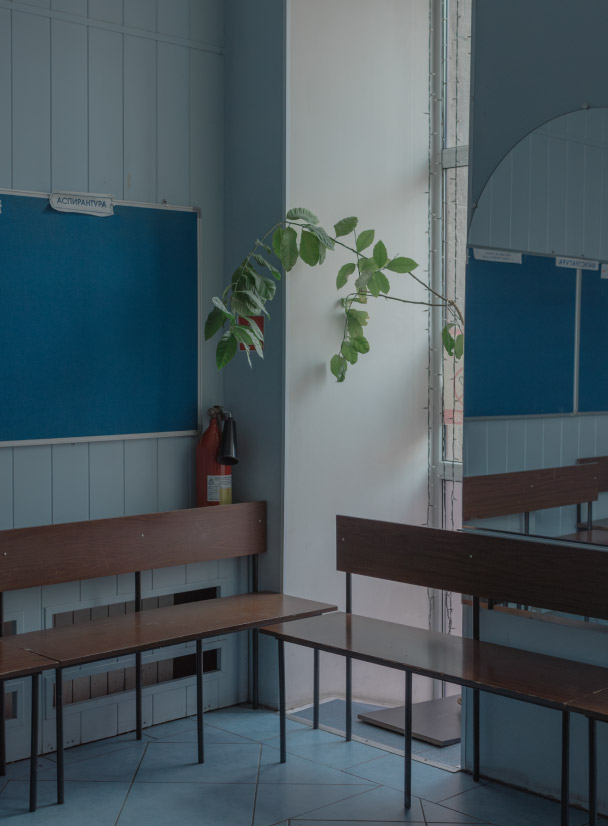
The demise of
Smolny College
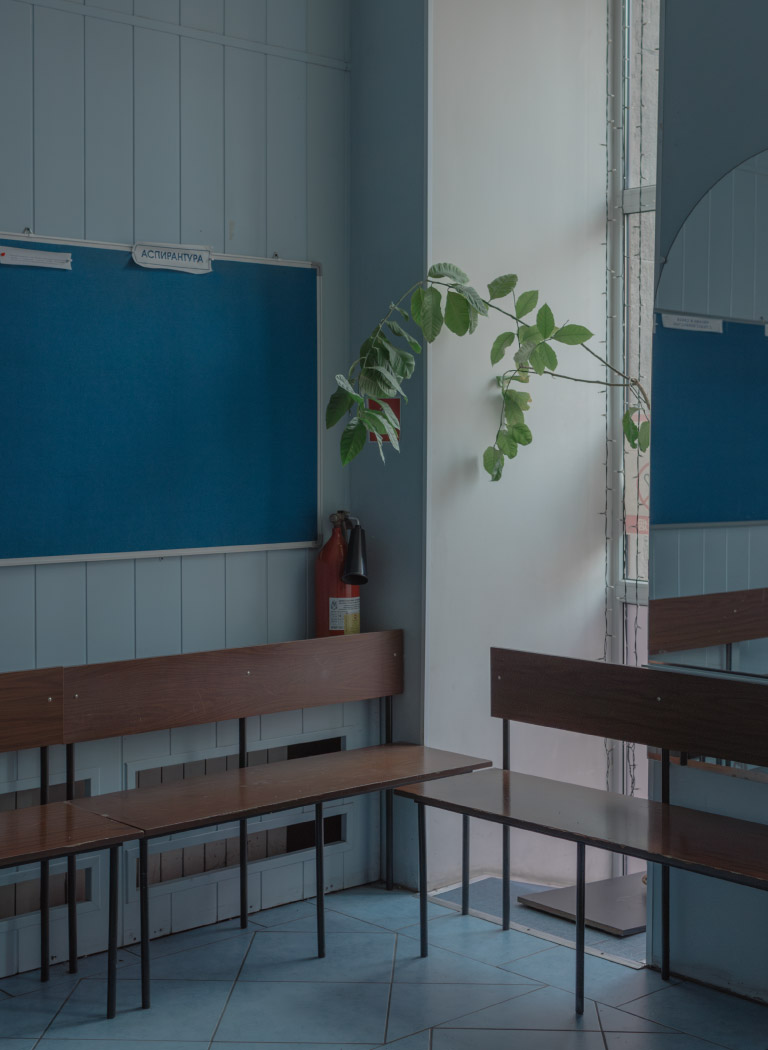
The demise of Smolny College

St. Petersburg State University, commonly known as SPbU, has long been one of Russia’s premier academies of higher learning. It is the alma mater of both Putin, who graduated with a degree in law in 1975, and former president Dmitry Medvedev, who received his law degree 12 years later and now routinely threatens nuclear strikes on the West as deputy chairman of Russia’s national security council.
In many ways, the university has become the leader in reprisals against students and staff not loyal to the Kremlin, with one newspaper dubbing it the “repressions champion” of Russian education. Its halls have become a microcosm of modern Russia in which conservatives in power are pushing out the few remaining Western-oriented liberals.
Like other aspects of Putin’s remastering of Russia — such as patriotic mandates in the arts and the redrawing of the role of women to focus on childbearing — the shift in education started well before the invasion of Ukraine. In 2021, Russia ended a more than 20-year-old exchange program between Smolny College and Bard College in New York state by designating the private American liberal arts school an “undesirable” organization.
Jonathan Becker, Bard’s vice president for academic affairs and a professor of political studies, said the demise of Smolny was emblematic of a wider shift in Russia as well as a new intolerance of the West.
“A huge number of faculty have been let go, several departments closed, core liberal arts programs which focus on critical thinking have been eliminated,” Becker said. “All of that has happened, and it’s not just happened at Smolny — it has happened elsewhere. But we were doubly problematic because we both represent critical thinking and partnership with the West. And neither of those are acceptable in present-day Russia.”
In October 2022, in a scene captured on video and posted on social media, dozens of students gathered in a courtyard to bid a tearful goodbye to Skopin, Smolny’s cherished philosophy professor who was fired for an “immoral act” — protesting Putin’s announcement of a partial military mobilization to replenish his depleted forces in Ukraine.
The month before, according to court records and interviews, Skopin was arrested at an antiwar rally. He ended up sharing a jail cell with another professor, Artem Kalmykov, a young mathematician who had recently finished his PhD at the University of Zurich.
That fall, the university launched an overhaul that all but shut Smolny College and replaced the curriculum with a thoroughly revamped arts and humanities program.
The dismantling of Smolny marked the resolution of a years-long feud between Kudrin, the liberal-economist dean, and Nikolai Kropachev, the university rector, whom tutors and students described as a volatile character with a passion for building ties in the highest echelons of the government.

It’s hard to describe the insane level of anxiety the students felt at the start of the invasion, and I’d say 99 percent of them were against it.”
Denis Skopin
Former philosophy professor at Smolny College

It’s hard to describe the insane level of anxiety the students felt at the start of the invasion, and I’d say
99 percent of them were against it.”

It’s hard to describe the insane level
of anxiety the students felt at the start
of the invasion, and I’d say 99 percent
of them were against it.”

It’s hard to describe the insane level of anxiety
the students felt at the start of the invasion,
and I’d say 99 percent of them were against it.”
In February, Sergei Naryshkin, the head of Russia’s Foreign Intelligence Service, sent a heartfelt birthday message to Kropachev, thanking him for his “civic and political activity” and for “comprehensive assistance in replenishing personnel.”
One student described how Kropachev once interrupted a meeting with students and hinted that he needed to take a call from Putin, in what the student viewed as a boast of his direct access to the Russian leader. Both St. Petersburg State University and Moscow State University were assigned a special status in 2009, under which their rectors are appointed personally by the president.
Skopin, who earned his PhD in France, and his cellmate, Kalmykov, were perfect examples of the type of academic that Russia aspired to attract from the early 2000s to the mid-2010s — enticed after studying abroad to bring knowledge home amid booming investment in higher education. But by 2022, the system seemed to have no need for them.
Video of the gathering in the courtyard shows students erupting in sustained applause, and one student coming forward to hug Skopin.
“It’s hard to describe the insane level of anxiety the students felt at the start of the invasion, and I’d say 99 percent of them were against it,” Skopin said.
After his dismissal, some students tried to fight the administration’s plan to dismantle the Smolny program.
“At one point we found ourselves in a situation where out of 30 original faculty staff, we had just three tutors left,” said Polina Ulanovskaya, a sociology student and activist who led the student union. “And the quality of education definitely suffered, especially all of the politics-related classes.”
Ulanovskaya said that on the political science track, only two professors have stayed, and many classes were eliminated, including a human rights course. There are now just two courses offered in English, down from 21.
With every new professor, Ulanovskaya said, she felt a need to test the waters. Would the word “gender” trigger them? Could she say something opposition-leaning? What would be a red flag?
Ulanovskaya opted out of writing a thesis on her main research topic — Russian social movements, politicization of workers and historic-preservation activists — out of fear that it would be blacklisted. Instead, she wrote about Uruguay.
“The main problem at the faculty now is that there is no freedom and especially no sense of security,” she said. “I guess there is no such thing anywhere in Russia now ... you can’t trust anyone in any university.”
A few weeks after The Post interviewed Ulanovskaya last fall, she was expelled, formally for failing an exam, but she and Skopin said they believe it was retaliation for her activism.
Another student, Yelizaveta Antonova, was supposed to get her bachelor’s degree in journalism just days after legendary Novaya Gazeta newspaper reporter Yelena Milashina was brutally beaten in Chechnya, the small Muslim-majority republic in southern Russia under the dictatorial rule of Ramzan Kadyrov.
Antonova, who interned at Novaya Gazeta and looked up to Milashina, felt she could not accept her diploma without showing support for her colleague. She and a roommate printed a photo of Milashina, depicting the reporter’s shaved head and bandaged hands, to stage a demonstration at their graduation ceremony — much to the dismay of other classmates, who sought to block the protest.
“They essentially prevented us from going on stage,” Antonova said. “So we did it outside of the law school, and we felt it was extra symbolic because Putin and Medvedev studied in these halls.”
They held up the poster for about half an hour, until another student threatened them by saying riot police were on the way to arrest them. Antonova believes the protest cost her a spot in graduate school, where she hoped to continue her research comparing Russia’s media landscape before and after the invasion.
Eight months after the graduation ceremony, authorities launched a case against Antonova and her roommate for staging an unauthorized demonstration — an administrative offense that is punishable by a fine and puts people on law enforcement’s radar. Antonova left the country to continue her studies abroad.

Ideological divides

The history college at St. Petersburg State has long been a battleground for various ideologies, with cliques ranging from conservatives and Kremlin loyalists to unyielding opposition-minded liberals, according to interviews with students and professors.
The February 2022 invasion of Ukraine caused a deeper split. Some students and professors openly praised Putin’s “special military operation,” as the Kremlin called the war, while others joined rallies against it.
“The war gave them carte blanche,” said Michael Martin, 22, a former star at the college — to which he was automatically admitted after winning two nationwide academic competitions and where he earned straight A’s.
Martin was a leader of the student council, which on the day of the invasion issued an antiwar manifesto quickly drafted in a cafe.
Another history student, Fedor Solomonov, took the opposite view and praised the special military operation on social media. When Solomonov was called up as part of the mobilization, he declined to take a student deferral and went to fight. He died on the front on April 1, 2023.
Soon after Solomonov’s death, screenshots from internal chats where students often debated history and politics were leaked and went viral on pro-war Telegram channels. In some, Martin and other classmates expressed antiwar sentiments, while another showed a message — allegedly written by an assistant professor, Mikhail Belousov — vaguely describing events in Ukraine as “Rashism,” a wordplay combining “Russia” and “fascism.”
In an aggressive online campaign, pro-war activists demanded that Belousov, who denied writing the message, be fired and that the antiwar students, whom they labeled “a pro-Ukrainian organized crime group,” be expelled.
“A cell of anti-Russian students led by a Russophobe associate professor is operating at the history faculty,” read posts on Readovka, a radical outlet with 2.5 million followers. “They are rabid liberals who hate their country.” Belousov was dismissed and seven students, including Martin, were accused of desecrating Solomonov’s memory and expelled.
Belousov has gone underground and could not be reached for comment.
“They essentially tried to make me do the Sieg Heil,” Martin said, recalling the expulsion hearing, where he said the committee repeatedly asked leading questions trying to get him to say the war was justified. The committee also asked him repeatedly about Solomonov.
“I said he was for the war and I was against it — we could argue about that,” Martin said. “I didn’t find anything funny or interesting in this — I’m truly sorry for what happened to him, but at the same time, I don’t think that he did something good or great by going to war.”
Martin said that as the war raged on, the university began “glorifying death” and praising alumni who had joined the military.
This narrative also warped the curriculum.
A few weeks into the invasion, the school introduced a class on modern Ukrainian history, with a course description asserting that Ukrainian statehood is based “on a certain mythology.”

They essentially tried to make me do the Sieg Heil.”
Michael Martin
Former student at St. Petersburg State University

Belousov, the former assistant professor, criticized a course titled “The Great Patriotic War: No Statute of Limitations,” taught by an instructor with a degree in library science. The key message of the course is that the Soviet Union had no role in the start of World War II — a denial of Russia’s joint invasion of Poland with Nazi Germany in 1939.
According to a government document reviewed by The Post, Russia’s Higher Education Ministry plans to introduce this course at other universities to ensure the “civic-patriotic and spiritual-moral education of youth,” specifically future lawyers, teachers and historians, and to “correct false ideas.”
“These are obviously propaganda courses that are aimed at turning historians into court apologists,” Martin said.
Martin was expelled days before he was supposed to defend his thesis. He quickly left the country after warnings that he and his classmates could be charged with discrediting the army, a crime punishable by up to 15 years in prison. A criminal case was initiated against Belousov on charges of rehabilitating Nazism.
“This is all very reminiscent of the Stalinist 1930s purges,” Martin said. “The limit of tolerated protest now is to sit silently and say nothing. There is despair at the faculty and a feeling that they have crushed everything.”

New Russian elite

To lure more Russian men to fight in Ukraine, the government has promised their families various sweeteners, including cheap mortgages, large life insurance payments and education benefits for their children.
In 2022, Putin approved changes to education laws to grant children of soldiers who fought in Ukraine admissions preferences at Russia’s best universities — schools that normally accept only students with near-perfect exam scores and impressive high school records.
Now, at least 10 percent of all fully funded university spots must be allocated to students eligible for the military preference. Those whose fathers were killed or wounded do not need to pass entry exams.
The new law solidified a previous Putin decree that gave special preferences to soldiers and their children. In the 2023-24 academic year, about 8,500 students were enrolled based on these preferences, government officials said. According to an investigation by the Russian-language outlet Important Stories, nearly 900 students were admitted to 13 top universities through war quotas, with most failing to meet the normal exam score threshold.
In areas of Ukraine captured by Russian forces since February 2022, a different takeover of the education system is underway, with Moscow imposing its curriculum and standards just as it did after invading and illegally annexing Crimea in 2014.
For the 2023-24 academic year, according to the Russian prime minister’s office, more than 5 percent of fully state-financed tuition stipends — roughly 37,000 out of 626,000 — were allocated for students at universities in Donetsk, Luhansk, Kherson or Zaporizhzhia, the four occupied or partly occupied areas of Ukraine that Putin has claimed to be annexed.
The relatively large allocation of tuition aid in occupied areas shows how financial assistance and education are central to Putin’s effort to seize lands in southeast Ukraine and absorb its population into Russia in violation of international law.
Deans of several leading Russian universities have made highly publicized trips to occupied Ukraine to urge students there to enroll into Russian schools, part of a multipronged effort to bring residents into Moscow’s orbit.
The Moscow-based Higher School of Economics, once considered Russia’s most liberal university, recently established patronage over universities in Luhansk, with Rector Nikita Anisimov often traveling there.

An inward turn

A few weeks after the invasion started, Moscow abandoned the Bologna Process , a pan-European effort to align higher education standards, as Russia’s deans and rectors strove to show they weren’t susceptible to foreign influence.
Higher Education Minister Valery Falkov said Russian universities would undergo significant changes in the next half-decade, overseen by the national program “Priority 2030,” which envisions curriculums that ensure “formation of a patriotic worldview in young people.”
Soon after Russia quit the Bologna Process, Smolny College was targeted for overhaul.
“The decision was an expected but distinct shift from the more liberal model of Russian higher education policy that emerged after the collapse of the Soviet Union,” said Victoria Pardini, a program associate at the Kennan Institute, a Washington think tank focused on Russia.
Another prestigious school, the Russian Presidential Academy of National Economy and Public Administration, canceled its liberal arts program in 2022 after authorities accused it of “destroying national values.”
In mid-October 2023, the Higher Education Ministry ordered universities to avoid open discussion of “negative political, economic and social trends,” according to a publicly disclosed report by British intelligence. “In the longer term, this will likely further the trend of Russian policymaking taking place in an echo-chamber,” the report concluded.

Russia’s position among
countries by number of
scholarly papers published
Source: Institute for Statistical Studies and Economics
of Knowledge

Russia’s position among countries by
number of scholarly papers published
Source: Institute for Statistical Studies and Economics of Knowledge

Russia’s position among countries by number of
Many international exchange programs have been canceled — some because Russian students now have difficulty obtaining visas. Still, a heavy brain drain is underway. “All those who could — they left the country,” Skopin said of his students. “Those who can’t are thrashing around as if they are in a cage.”
Martin is among those who got out — he was recently accepted into a prestigious master’s program abroad and plans to continue his research into 19th-century Australian federalism.
Skopin now teaches in Berlin and is a member of Smolny Beyond Borders, an education program that seeks funding to cover the tuition of students who leave Russia because of their political views. As of late 2023, an estimated 700 students were enrolled.


IMAGES
VIDEO
COMMENTS
Education is a cue card topic that often comes up in the IELTS speaking part 2. Below you will find a list of some exam questions and answers that you could encounter during part 2 of the IELTS Speaking test. The questions below are based on the real IELTS speaking exam. They serve as a great IELTS Speaking part 2 cue card prediction questions ...
This is the essential vocabulary for education about schools, subjects, studying and university. There is an audio to listen to the pronunciation of the words. ... Aim to absorb 70% of the vocab for each topic. Use those words daily by a) speaking to yourself about the topic - express your thoughts, have debates with yourself b) write an ...
higher education: education, usually in a college or university, that is followed after high school or secondary school. an intensive course: a course that offers lots of training in order to reach a goal in as short a time as possible. to keep up with your studies: to not fall behind. to learn something by heart: to memorize it.
In IELTS Speaking test you are assessed for your fluency and coherence, and thus you have to accurately use your advanced vocabulary while speaking. In this IELTS Speaking sample we collected various questions + model answers on Education Topic that you may encounter on the speaking test. Our special formatting styles: Useful linking phrases ...
Download Study Plan. In IELTS Speaking Part 1, to answer IELTS examiner's questions in a natural and fluent way, you should focus on one idea only and then expand that idea into a long meaningful sentence using grammar patterns and vocabulary, which can help you get Band 8.0+ for IELTS Speaking. Let's practice it with some easy questions ...
Video playlists about Education. 17 talks. The Butterfly Effect: Talks from the TEDinArabic Summit. In March 2023, 17 speakers from across the world gathered in Doha for the inaugural TEDinArabic Summit. From climate change and politics to sports and fashion, enjoy this sweeping selection of talks. 15 talks.
In this article, I am going to tell you all about education and IELTS. As you know (if you follow this website), the best way to learn new vocabulary is to study in terms of topics. There are many IELTS topics, such as environment, space, sports, health, and crime. We have talked about education many times in the past but today I will devote a ...
Vocabulary words related to education and definitions: authentic: real, true. old-school strict: traditional learning with punishments and controlling teachers. teacher centred: where the teacher is leading the class. encourage collaboration: learning together through discussions. pressure to meet deadlines: having to finish work by a certain ...
😁 25% Discount on my online IELTS Speaking GOLD course: https://keithspeakingacademy.com/ielts-band7-gold-yt👉 Download the free PDF of this lesson here: ht...
2. 3. 4. TED-Ed lessons on the subject Speaking. TED-Ed celebrates the ideas of teachers and students around the world. Discover hundreds of animated lessons, create customized lessons, and share your big ideas.
Learn English with the BBC. We publish new videos, podcasts, tutorials and lessons every week to help you learn and improve your English speaking, listening, vocabulary and pronunciation ...
For the third and final part of this series, I'm providing you with public speaking tips that will help reduce your anxiety, dispel myths, and improve your performance. Here Are My 10 Tips for Public Speaking: 1. Nervousness Is Normal. Practice and Prepare! All people feel some physiological reactions like pounding hearts and trembling hands.
Answer: The primary role of a teacher should be to teach his/her students the curricular lessons of the school. But, at the same time, a teacher should also act as a "mentor" or "role model" in the classroom so that his/her students can learn many other important "lessons of life", such as the value of discipline, punctuality, hard ...
Vocabulary and idioms you need to describe about your daily routines. ENVIRONMENT in IELTS Speaking Learn different ways to protect our environment and discuss it with idioms and vocabulary in this lesson. MEDICINE in IELTS Speaking Learn the COVID Vocabulary for IELTS Speaking and talk about Alternative Medicines using idioms and vocabulary.
Speaking Technology and Digital. In this two-part series, ELT teacher trainer and author Ceri Jones discusses how to teach speaking in an online environment. In this article, Ceri talks about the differences between online and face-to-face speaking practice.
In this article you will learn some key vocabulary and read some sample answers for IELTS speaking part 3 questions related to the topic of education. Entrepreneur (n) - a person who starts a business. Vital (adj) - very important/needed. Tough (adj) - difficult. A multitude of (n)- very many.
Public speaking can be a daunting task, but it's a vital skill in higher education and beyond. Whether you're delivering a lecture, presenting research, or leading a seminar, the ability to ...
The topic Education often appears in IELTS Speaking Part 3. Here are sample answers to this topic. 1. Do you like the education system of your country? Yes, I feel that education system of my country covers almost all the basis but there is one area where we can improve a lot and that is curriculum.The syllabus is very old and needs an immediate change.
IELTS Speaking chủ đề Education Part 1,2,3: Từ vựng & bài mẫu. Bài viết này sẽ gợi ý những từ vựng cần thiết và cấu trúc ngữ pháp áp dụng hoàn hảo cho chủ đề Education, cùng IDP xem qua nhé! Với những bạn thí sinh còn đang là học sinh, sinh viên thì chủ đề về Education ...
Types Of Speaking Skills And Frameworks. While speaking effectively is rewarding, it is also challenging. Various speaking skills and frameworks can help overcome the challenges. 1. Aristotle's Appeals. One of the most useful frameworks speakers use is Aristotle's Appeals. They help you find various ways to appeal to the audience.
Back at P.S. 321 in Park Slope, she relished her relationships with teachers, sometimes preferring to hang out with them instead of going to recess. At New Humanitarian, she could barely talk to ...
an outstanding british education. At the International School of Moscow (ISM), your child will benefit from a world-class British education and the highest standards of teaching and learning. In our close-knit international community, highly qualified native English-speaking teachers support and challenge every student to achieve academic success.
N.I. Lobachevsky offers about 400 main and additional programmes for international citizens speaking English. ... (DC&MP) and Experimental Higher Education. Ural Federal University named after the first President of Russia B.N. Yeltsin just celebrated its centenary. The university is a leader in research and education in Russia. Among the 450 ...
The letter, written by District 2 Jefferson County Board of Education member Chris Kolb, accused principals of "contributing to a damaging narrative about JCPS," and warned that their actions "reflect very, very poorly" on JCPS Superintendent Marty Pollio. The letter came a day after a heated board meeting, during which dozens of school ...
By Elaine Mallon. May 10, 2024 3:21 pm. . U.S. Ambassador to the United Nations Linda Thomas-Greenfield will no longer be speaking at Xavier University of Louisiana's commencement ceremony on ...
The graduation address will be given by Allison Schmitt, a UGA alumna, and decorated American athlete, who is a mental health advocate. She has spoken widely abut her personal struggles with ...
Editor's note: The interview was conducted at the Elysée Palace in Paris on April 29th. The French transcript has been lightly edited for clarity. This English translation was done by The ...
0:03. 1:29. Microsoft plans a major expansion of artificial intelligence education and job training programs in southeast Wisconsin, along with a huge increase in its plans for a data center ...
HARTFORD — The University of Hartford's graduation is this weekend, and some students are concerned about a Lockheed Martin executive speaking at one of the commencement ceremonies. As protests on college campuses across the country have popped up in recent weeks, some students say the university's decision to allow Jay Malave, chief ...
Russian university leaders are imbuing the country's education system with patriotism to favor Putin, quashing Western influences and dissent. Yelizaveta Antonova leaves the journalism college ...